My 2021 @araieu helmet. Hope you like the subtle changes we done with @drudi_performance. 🤙

Source: Jonathan Rea On Facebook
My 2021 @araieu helmet. Hope you like the subtle changes we done with @drudi_performance. 🤙

Source: Jonathan Rea On Facebook
Us bikers are a funny lot when it comes to change. For a bunch of people who roar around on our two-wheeled rebellion machines revelling in the thought that we’re different from all the rest, we still seem to be as stick-in-the-mud-ish as anyone when things don’t stay the same.
While staring down extinction in the form of plummeting sales, the death of internal combustion and a rapidly aging customer base, oh how we mocked those silly hipsters who flocked to the community with their youthful exuberance and industry-saving spare cash.
Then we complained about electronic aids ‘taking over’ from humans mere milliseconds before throwing our hard-earned money at BMW’s S1000RR with its 200 traction-controlled horses, clutchless shifts and hilarious computer-aided wheelies. And don’t get us started on those hippy-hugging electric bikes with their planet-twisting amounts of torque and non-existent running cost.
So, what’s really moved the dial in the past 5 years? Here are our top 5 developments in motorcycling that ruffled some old school feathers while also steadfastly proving to be a whole more fun than most riders could ever have imagined.
With female suffrage celebrating its 100 year anniversary in most Western countries around about now, it seems rather incredible that we’re sat here discussing something like this, but yet here we are. And is it any wonder? To this day, we still overhear old male bikers at popular rest stops espousing some pretty old-fashioned views about women and their supposed biking abilities.
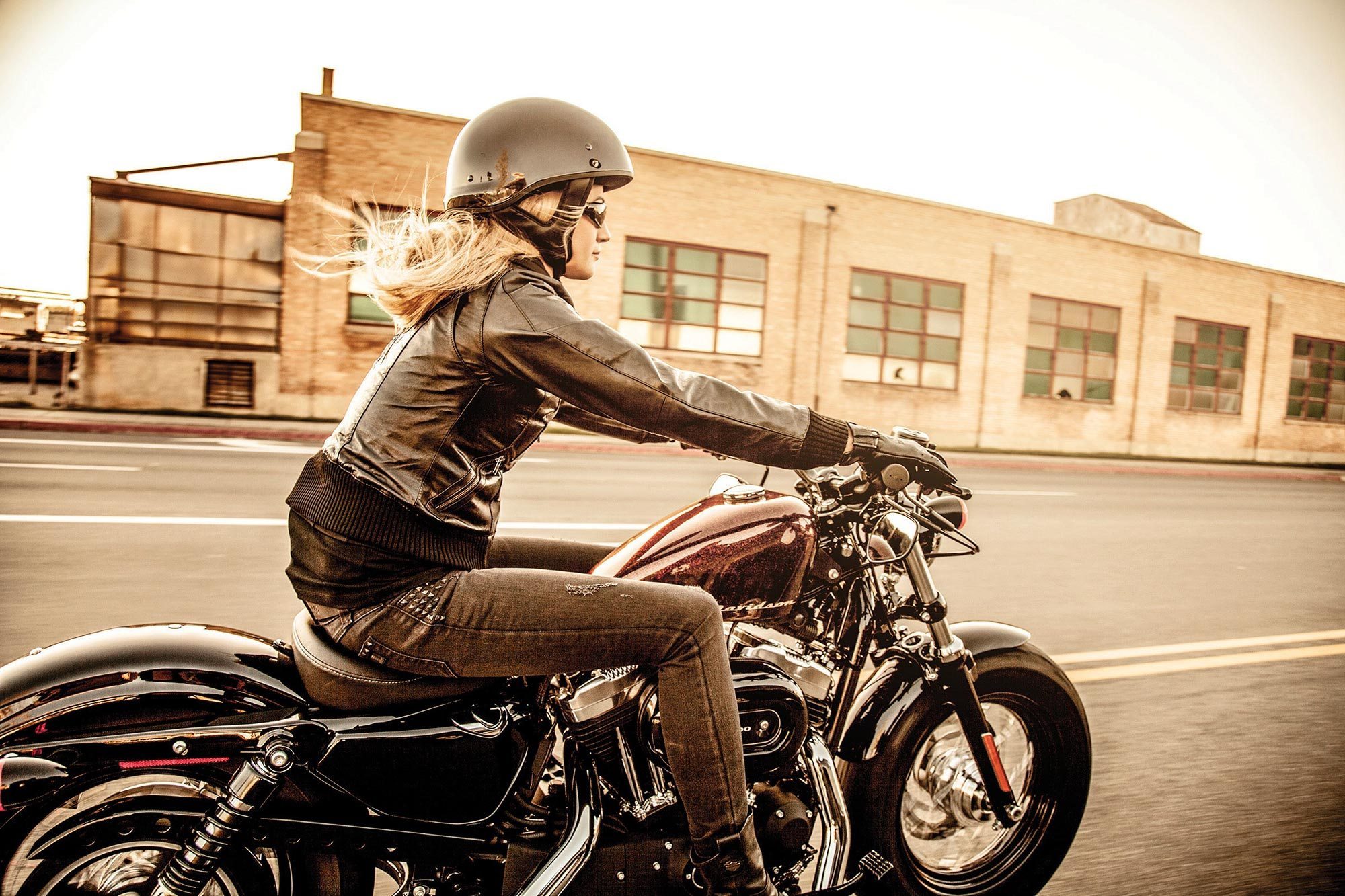
Much to the amazement of motorcycling’s old mates, they don’t own the sport and no one’s really listening to their dyed-in-the-wool views on what women can and can’t do anyhow. Or to put it another way, if picking up a dropped BMW 1200 GS or kickstarting an old Harley is the sole test of motorcycling capabilities, there’d be an army of men out there that should be hanging up their helmets immediately.
So for the first time ever, women are now feeling that bikes are an enjoyable pastime rather than an expensive way to get more sleazy, ignorant comments. And from a manufacturer’s point of view, it looks a lot like they’ve just doubled their customer base. Just imagine what all that extra cash will do for their R&D budgets, design departments and new model releases?
It seems like only yesterday that we’d all stand around gawking like fools as that Hayabusa rolled into the carpark of our local meet-up spot. ‘It’s got 170 horsepower!’ we babbled as the rider took twelve attempts to reverse park the Cadillac-length behemoth.
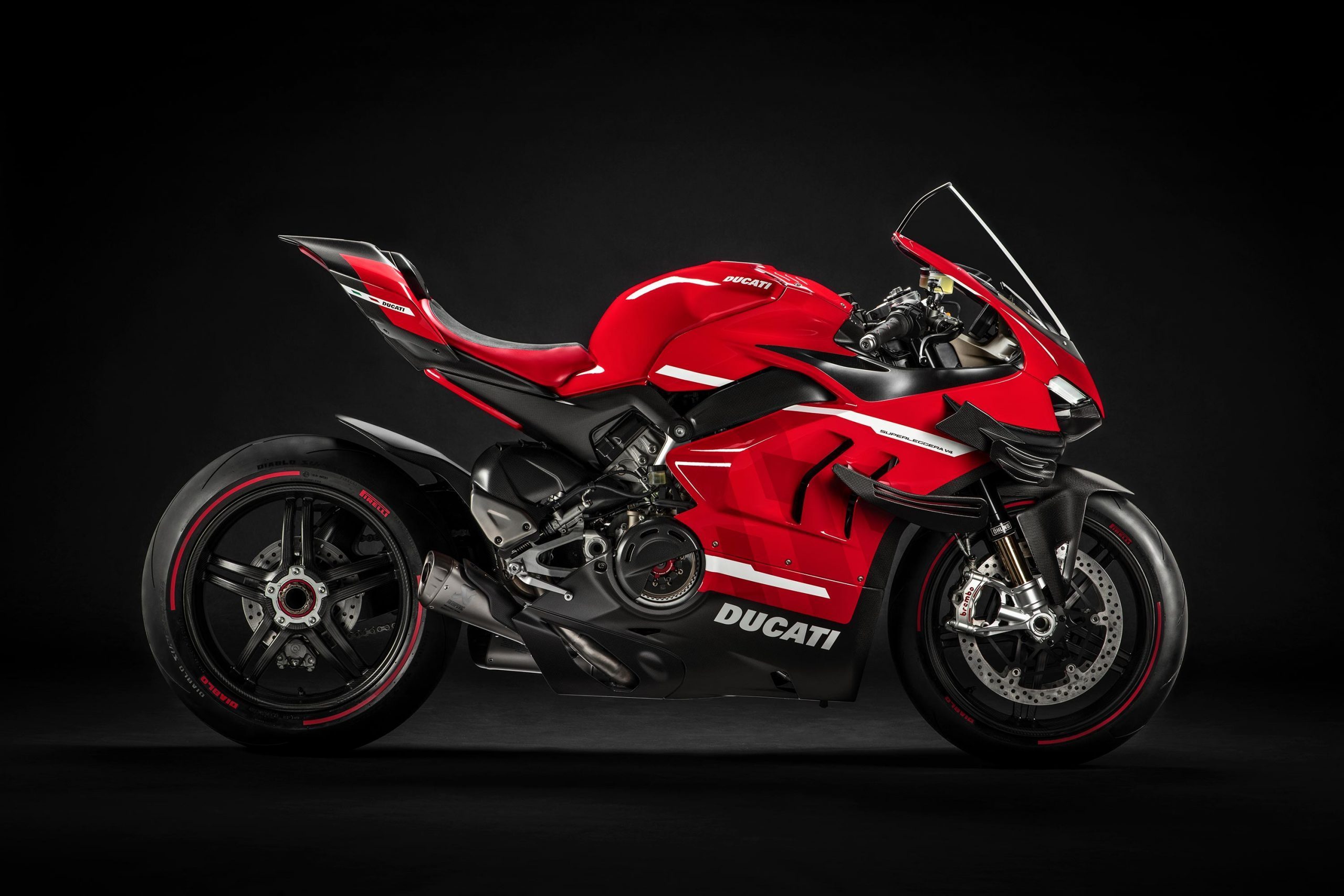
Fast forward 10 years, and it seems like the ’Busa and Honda’s once mythical Super Blackbird are now underpowered and even a little – dare we say it – slow. Why froth over 170 horses when there’s Kawasaki’s H2 with 228 ponies or Ducati’s 152 kg (335 lb), 221 HP V4 Superleggera. Hell, that thing’s got too much damn boom-boom for World Superbike and it’s also road-legal. Just think about that for a moment.
Of course, all this furious power and near-lightspeed capabilities are only possible thanks to the new-fangled electronic doohickies Ducati and Kawasaki’s white-coated boffins and installed to stop us all from becoming red smears down our local set of twisties. So all you naysayers from 5 years ago, tell us again how ABS brakes are for learners who can’t modulate their stopping? We’re all ears.
We’ve all seen the YouTube videos of Teslas mercilessly kicking Porsche, Lambo and Ferrari butt. They don’t even seem to break a sweat doing it. So don’t kid yourselves, the same thing’s going to be happening to motorbikes before you can properly pronounce the name of Elon Musk’s kid.
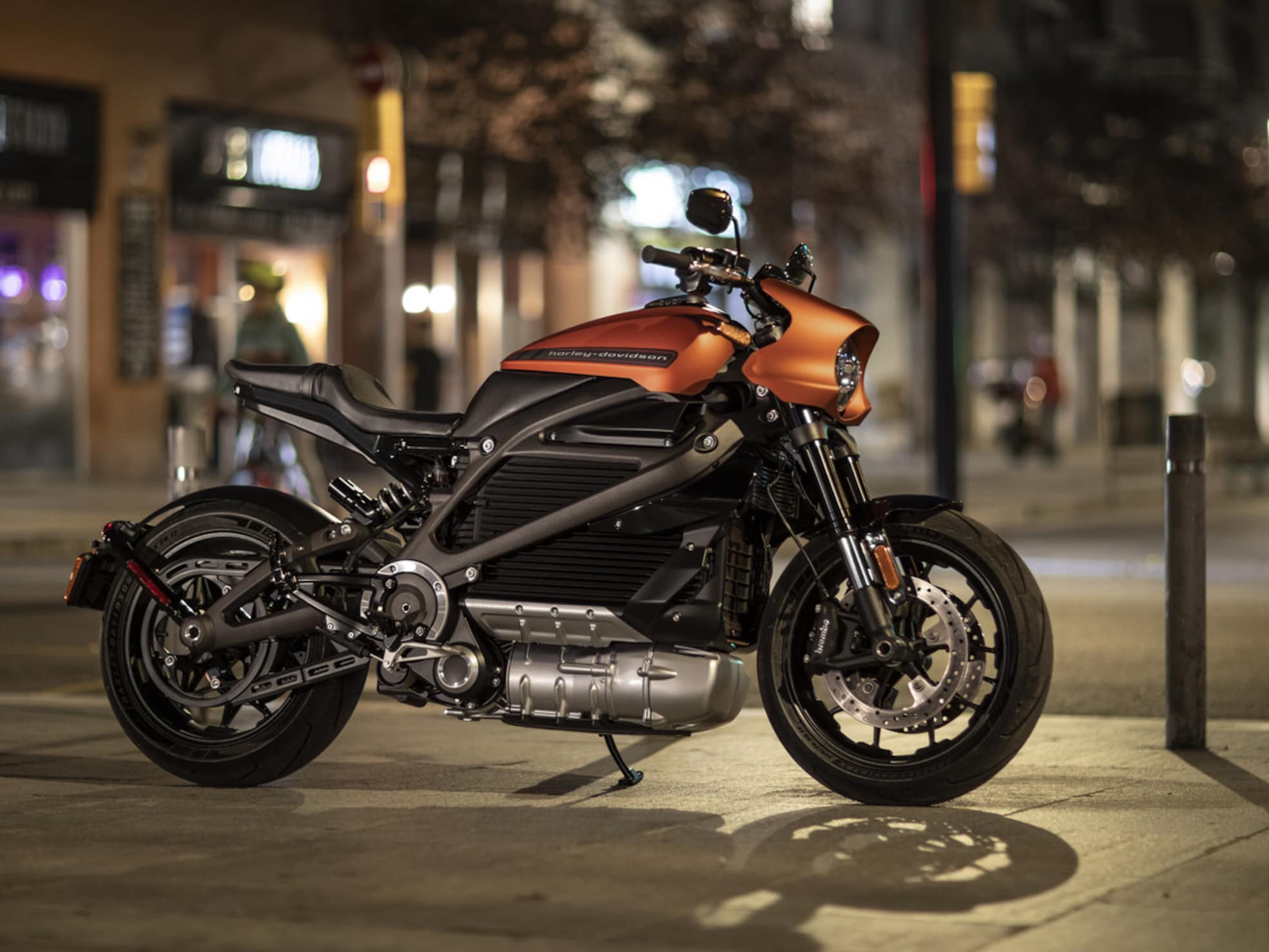
Yes, Harley’s beautiful but cripplingly expensive Livewire may have produced a few chuckles and raised eyebrows, but their management knows better than anyone that internal combustion is going the way of the liquified dinosaurs it needs to make those old engines spin.
And while you may fret about missing the ‘soul’ of petrol engines and ‘that amazing exhaust sound,’ imagine for a moment your 2035 Yamaha electric naked, with its 250 horses, 4 year service intervals, chump change running costs and bottomless pit of arms-stretching torque. How will we ever survive?
While it’d be hard to argue that off-road riding itself has blossomed in recent years, what is obvious is that riders who are looking for ‘the next big thing’ after cafe racers are gawking squarely at scramblers and trackers for their new hit of moto cool.
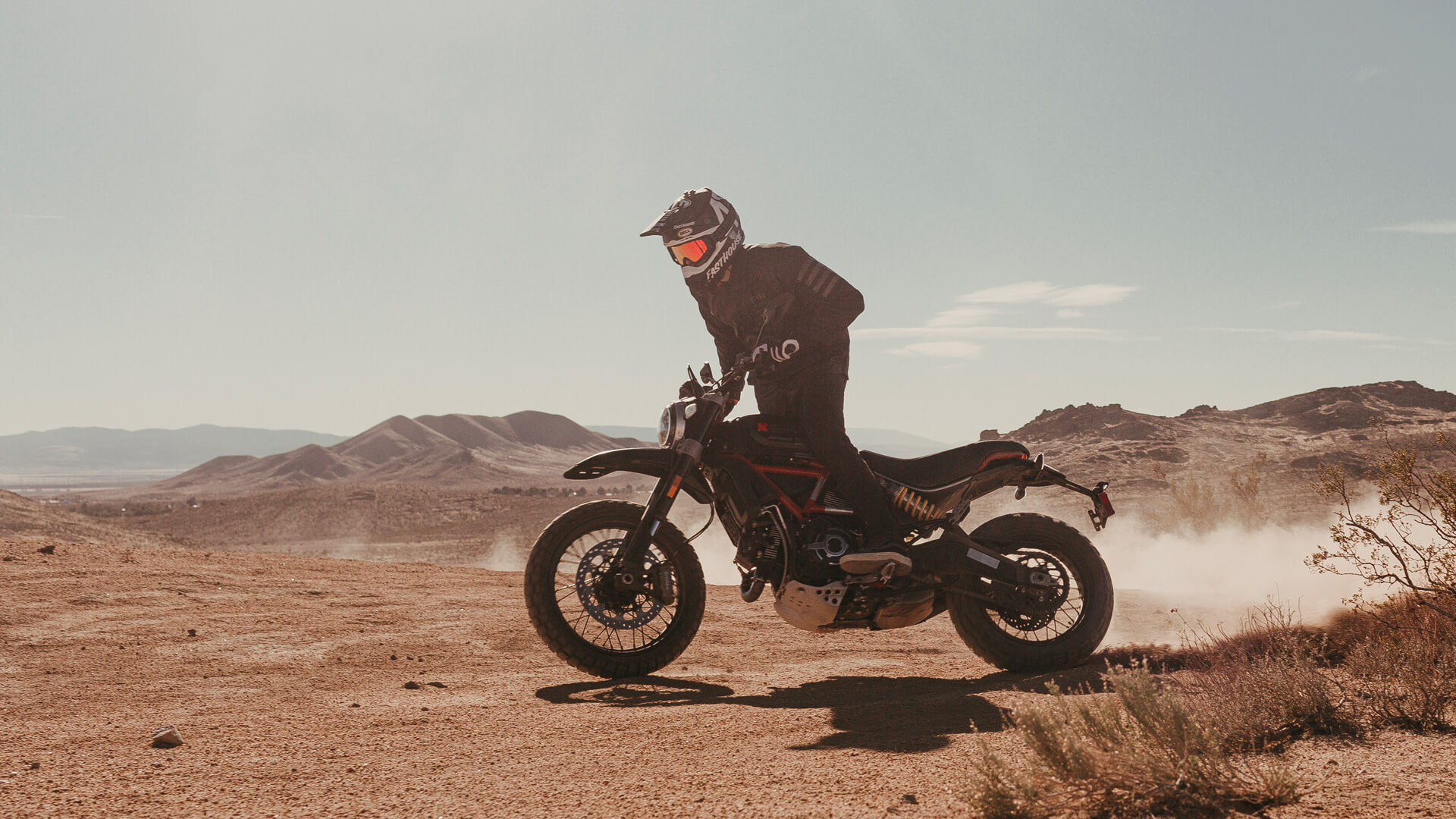
And the manufacturers also see this. Just think of BMW’s scrambled version of their RnineT, Ducati’s Scrambler, Triumph’s retro, erm, Scrambler 1200 or Indian’s FTR 1200. Now, cast your gaze to the other end of the market, where Chinese-made beginner bikes that used to be cafe’d-up to within an inch of their lives are now leaving their Guangdong factories with knobby tyres and high pipes.
Yes, you could probably argue that many of these bikes will never see dirt in their lives, but as with all those Landcruisers and Land Rovers, it doesn’t stop their owners from falling in love with the idea of an outdoor life or screaming around a flat track with their foot down and mud in their teeth.
We’ve touched on this already, but it’s becoming increasingly clear that electronic intervention has many more benefits than it does negatives. 5 years ago, it all looked rather hamfisted, nanny-esque and a little pointless. Sure, ABS might be OK for those of us without the proper experience, but for the rest of us? Obviously, we’re just too skilled to really need it.
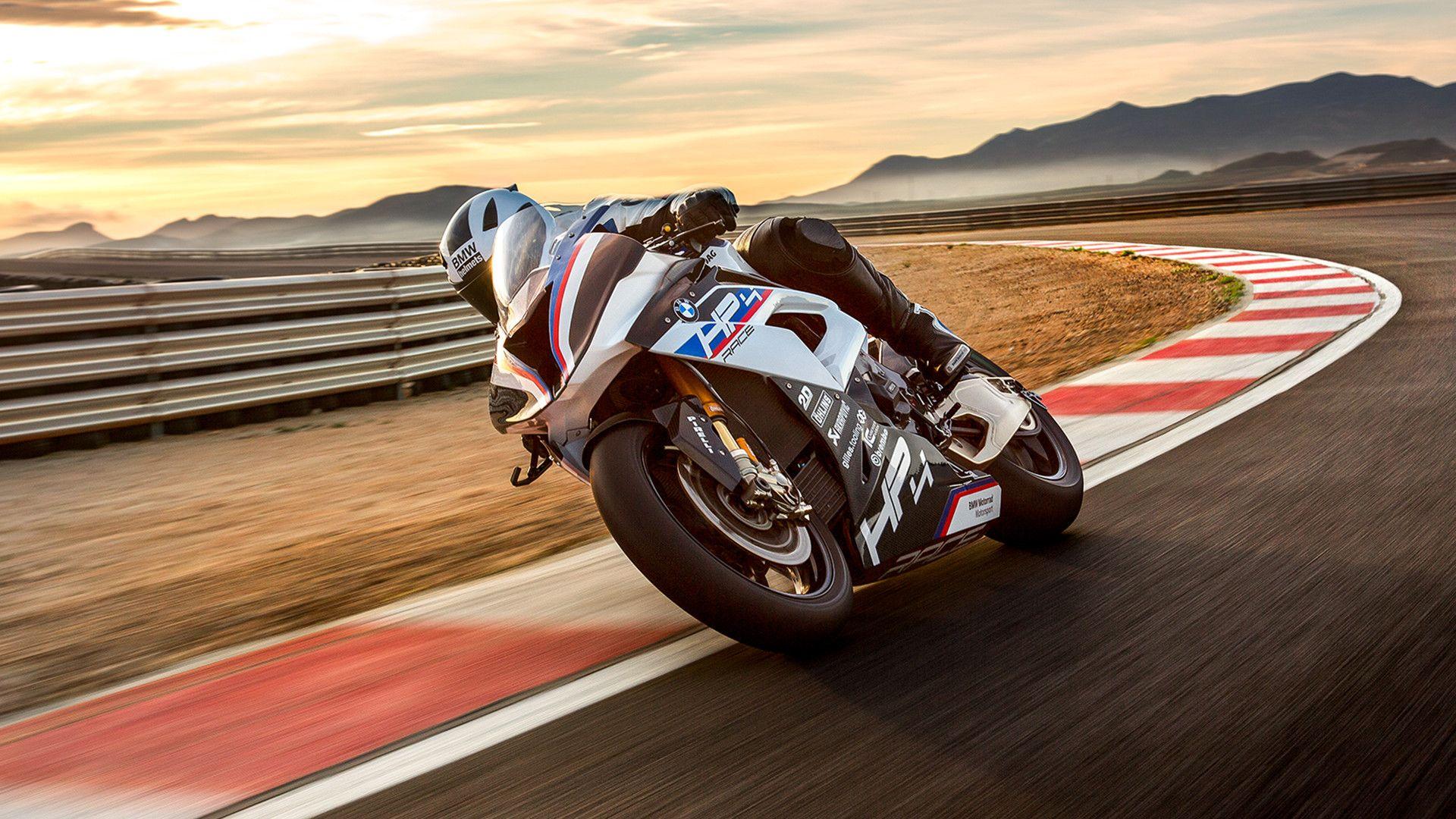
Now, fast-forward to journos stepping off BMW’s uberrad HP4 at a loss for words after having their brains deep-fried and their top-shelf expectations shattered like a COVID safety plan at a spring break party.
Of course, the irony here is clear as day. While we’re now eating our words and riding like Rossi thanks to the very safety nets we were so skeptical of in 2015, much of this tech is already redundant or at least ready for a major overhaul with the imminent rise of electric bikes. Who needs quick shifters and engine braking when there are no gears and your permanent-magnet direct current electric motor stops and starts instantly?
This is going to make us sound old, but in our day, beginner bikes were an embarrassing right-of-passage that sorted out the wannabes from the truly committed. You try turning up to a ride with strangers on 1000cc Gixxers with your ’91 Honda CB250 and not feeling like a complete clown. It’s just not humanly possible.
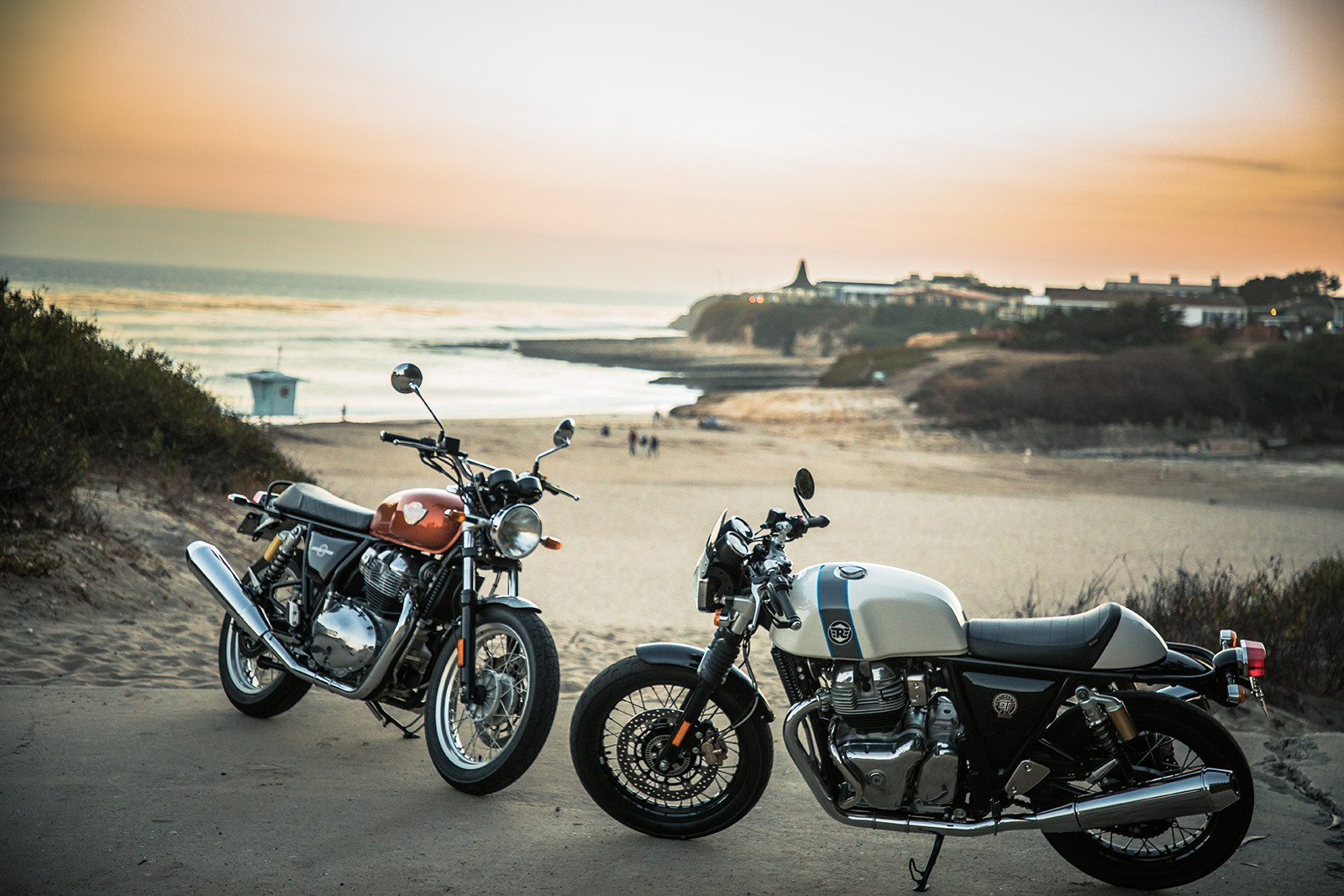
And while some liberty-lovin’ countries are perfectly happy to allow complete amateurs onto litre bikes without helmets, most of the world’s riders know full well that you have to learn to crawl before you can walk. Of course, there’s always a classic bike from the 70s that will look cool and be relatively manageable, but what newb has the skills to fix a fifty-year-old, misfiring CB750 by the side of the road in a downpour?
But just look at the options now: Yamaha’s MT07, Royal Enfield’s 650 twins, Triumph’s Street Triple and the Ducati Monster 659 are all up for grabs along with a raft of other incredible, capable and decidedly non-lame options.
And apart from the undeniable coolness factor with all these bikes, there’s the added financial boon of not having to immediately upgrade your embarrassing training bike once you’ve earned your licence stripes. Show me a new rider that thinks an MT07 is beneath them and I’ll show you someone who’s got a hot date with a highside.
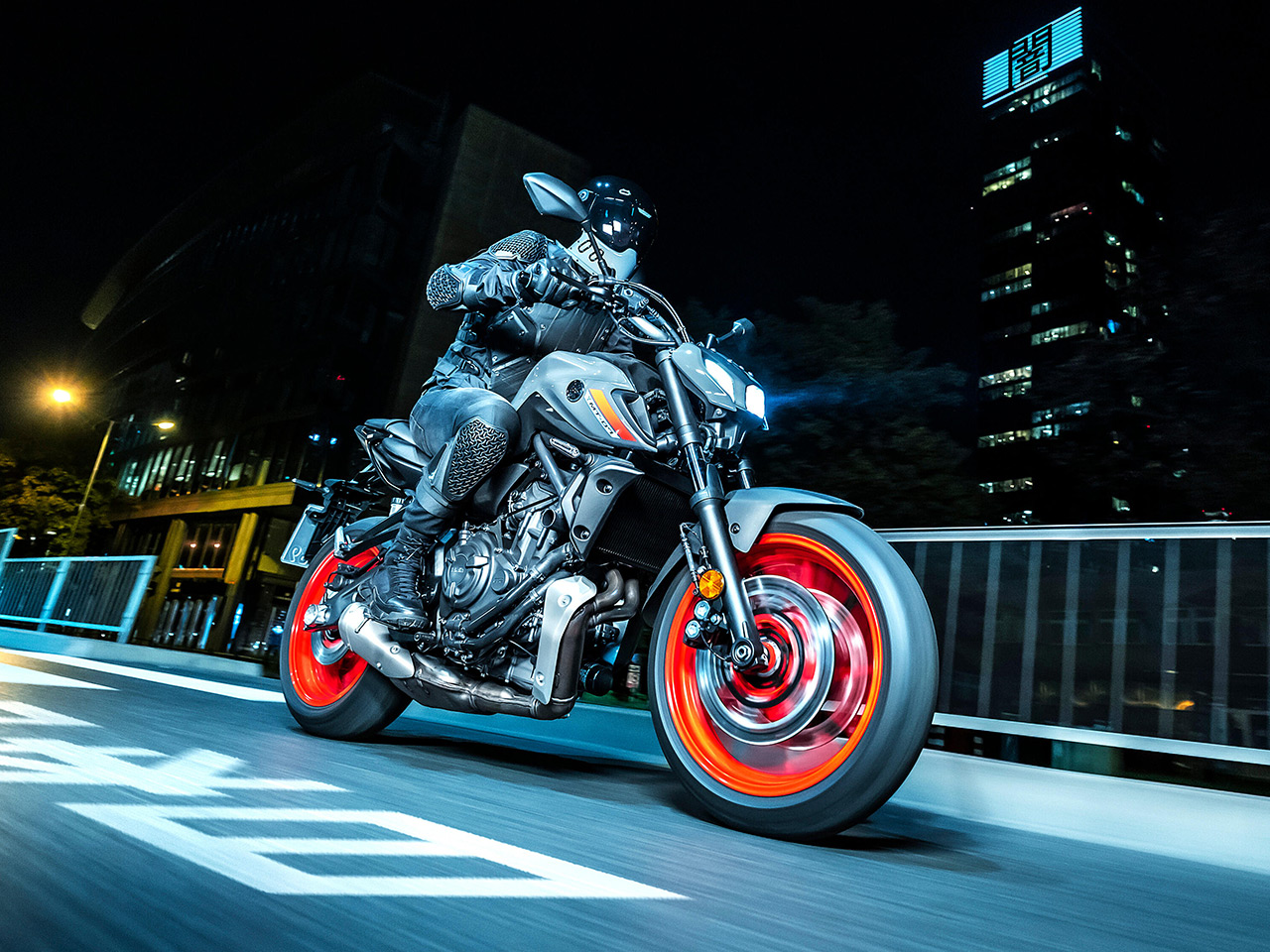
Source: MotorbikeWriter.com
Triumph Motorcycles made noise in 2019 after taking over official engine supplier duties (from Honda) in the Moto2 World Championship. To commemorate this milestone, Triumph has manufactured a street-legal Moto2 sportbike replica with its carbon fiber-clad Daytona Moto2 765 Limited Edition ($17,500).
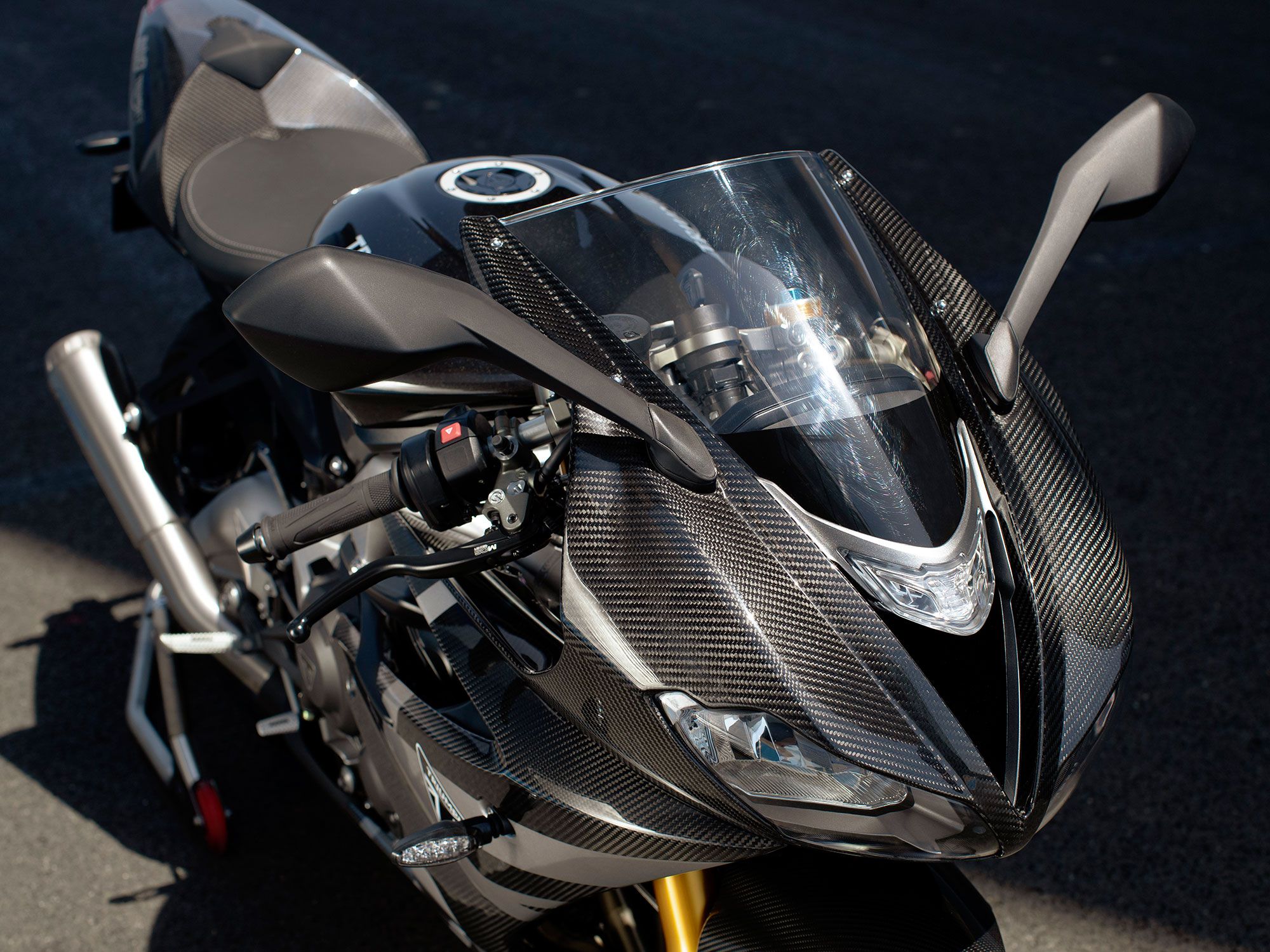
Editor’s note: We reported on this vehicle during the Triumph Daytona 765 Moto2 First Look and 2020 Triumph Daytona 765 Sportbike Unveiled articles. This content speaks about the Daytona’s riding dynamic on the street. Also read the 2020 Triumph Street Triple RS MC Commute Review to get up to speed on its sister offering.
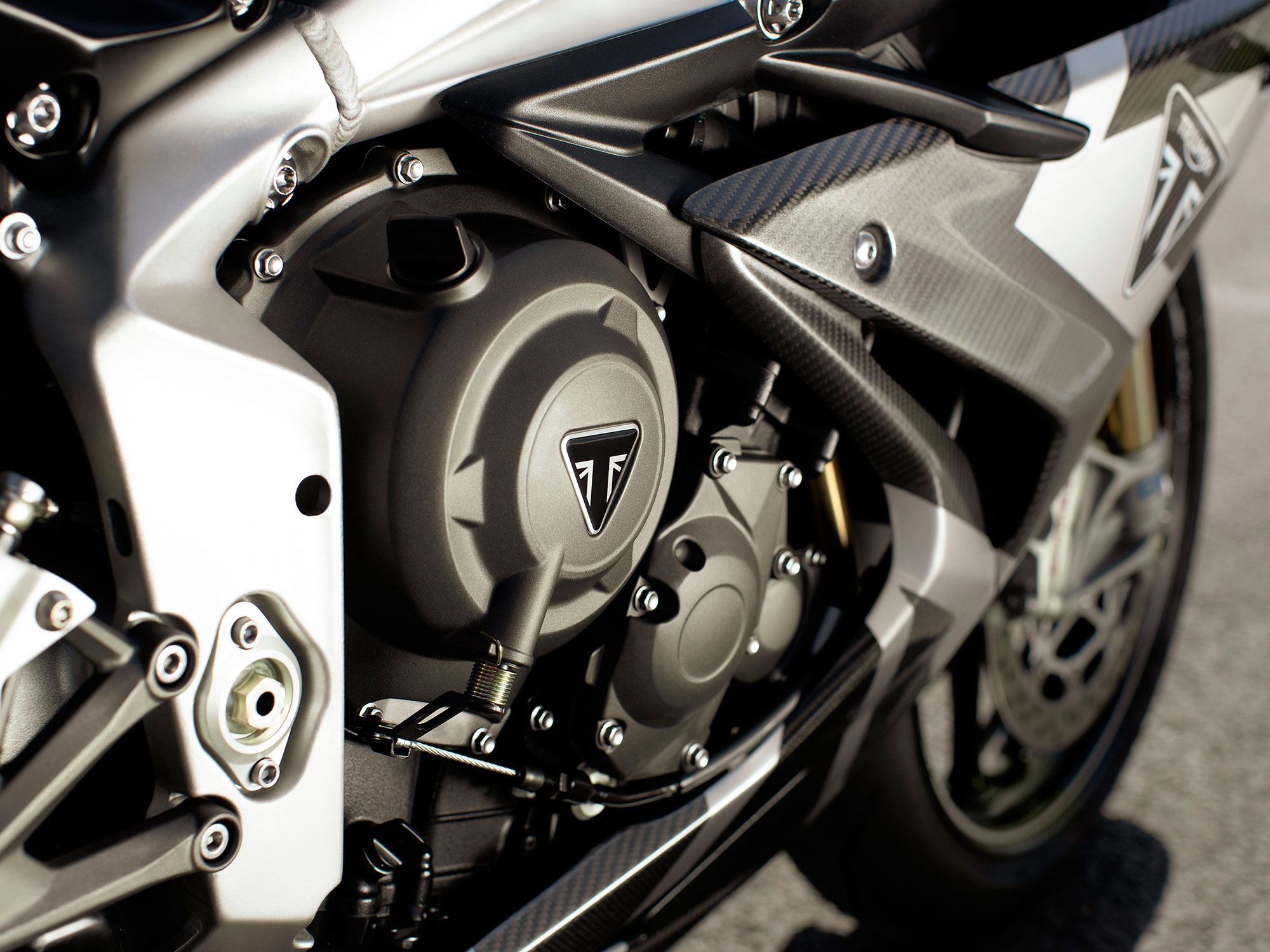
Swing a leg over the Daytona 765 and the seating position feels familiar for longtime Daytona 675 riders. The bike is narrow between the rider’s legs with a tall, forward-slanted seat wrapped in a premium high-grip material with fine stitching. The clip-on style controls are positioned in a focused-track-style manner. On a side note, there are no passenger accommodations.
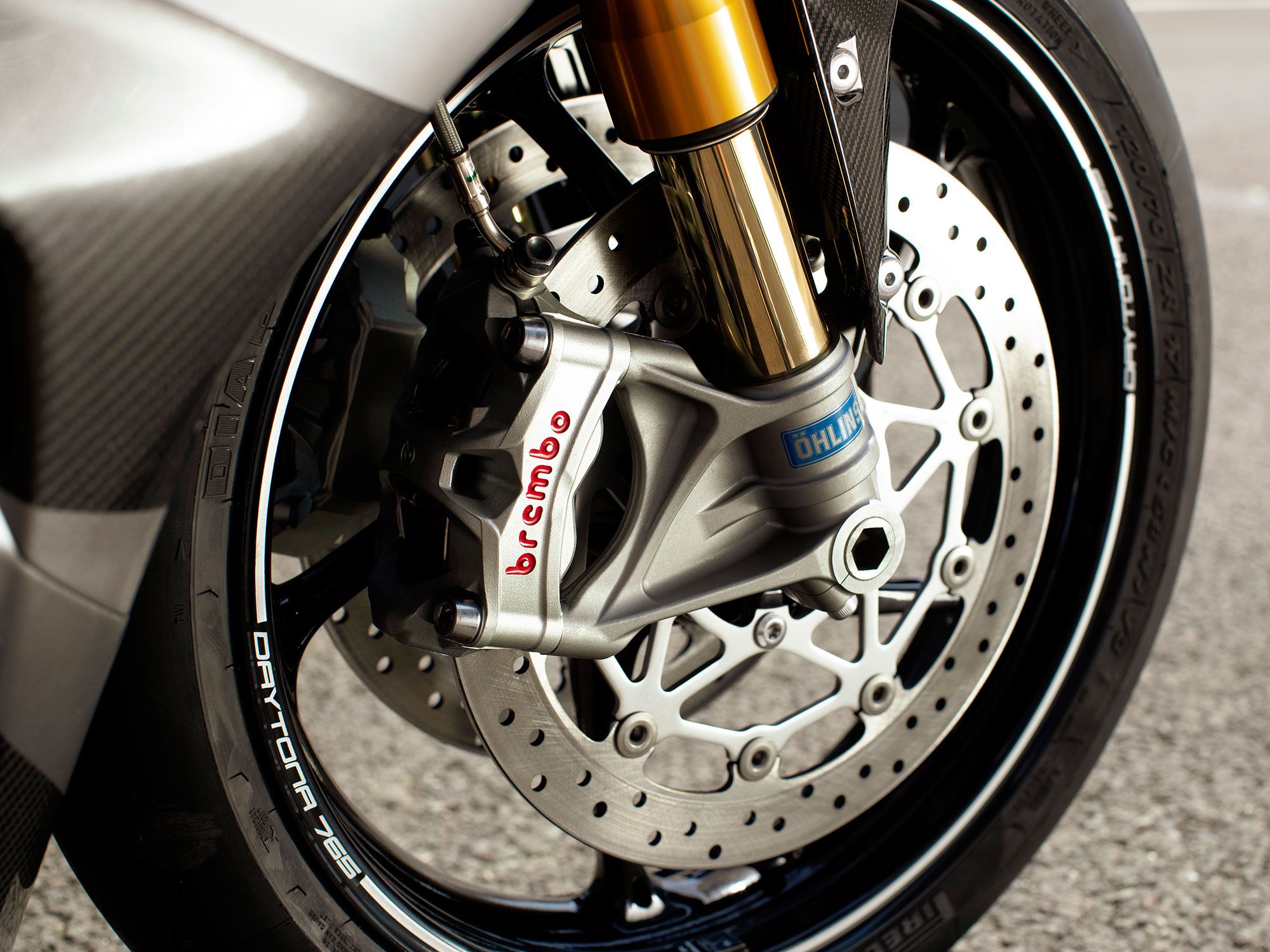
A new color TFT display and updated top clamp etched with the vehicle’s production number signal you’re aboard something special. Fire up the engine and the I3 whines to life with its signature note. It sounds even more sweet with its OE-fitted Arrow titanium muffler.
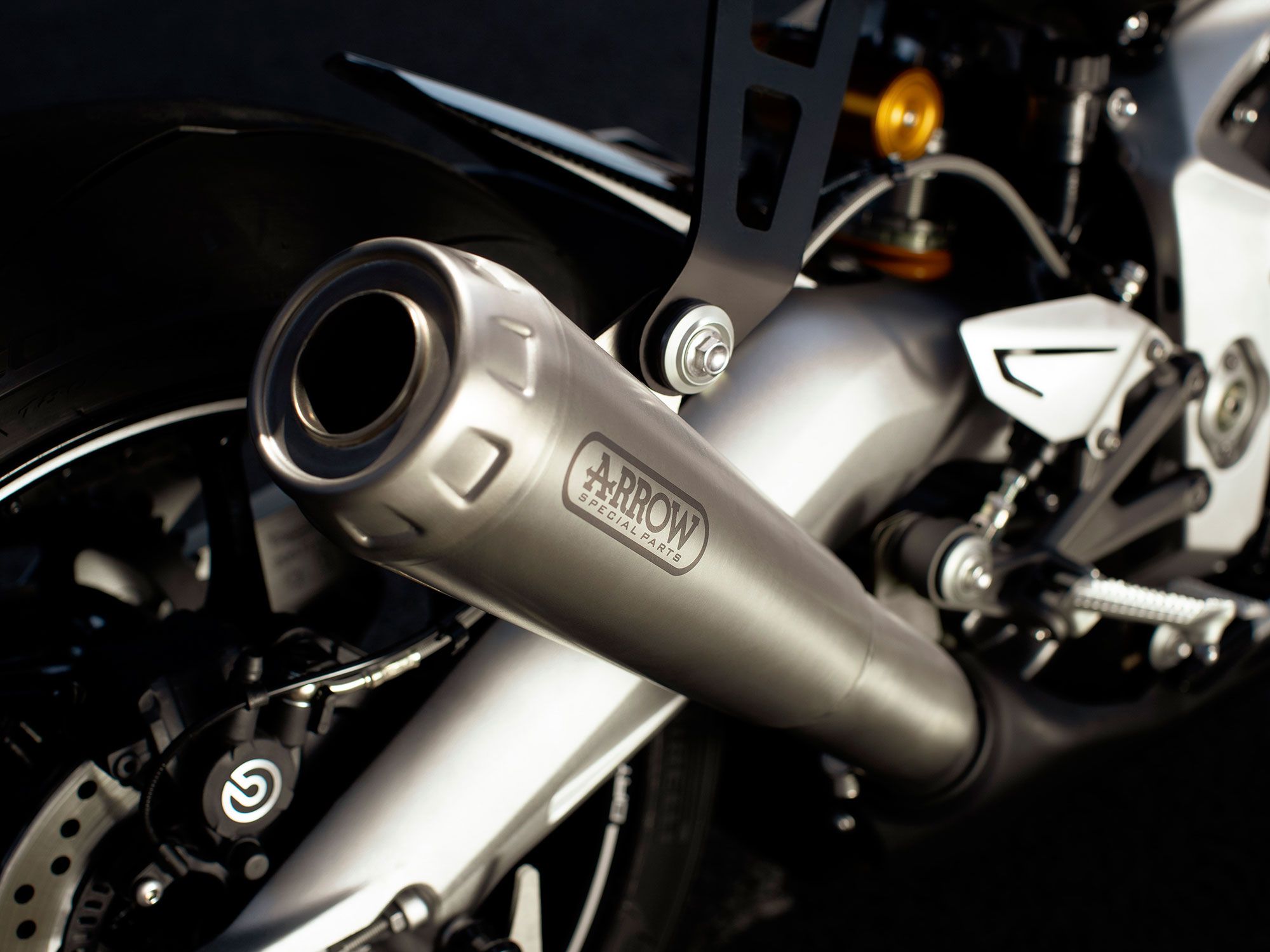
With its larger-capacity 765cc engine the Daytona has added punch, especially off the bottom. This helps pull its taller first gear with ease and not much clutch slip. Renowned for its midrange, the engine is subtly fatter in this rpm range too. An electronic up-and-down quickshifter makes it easy and fun to rip through the six-speed gearbox. Triumph says the engine is good for 128 hp but we estimate around 116 ponies at the Pirelli Diablo Supercorsa SP V3 rear tire.
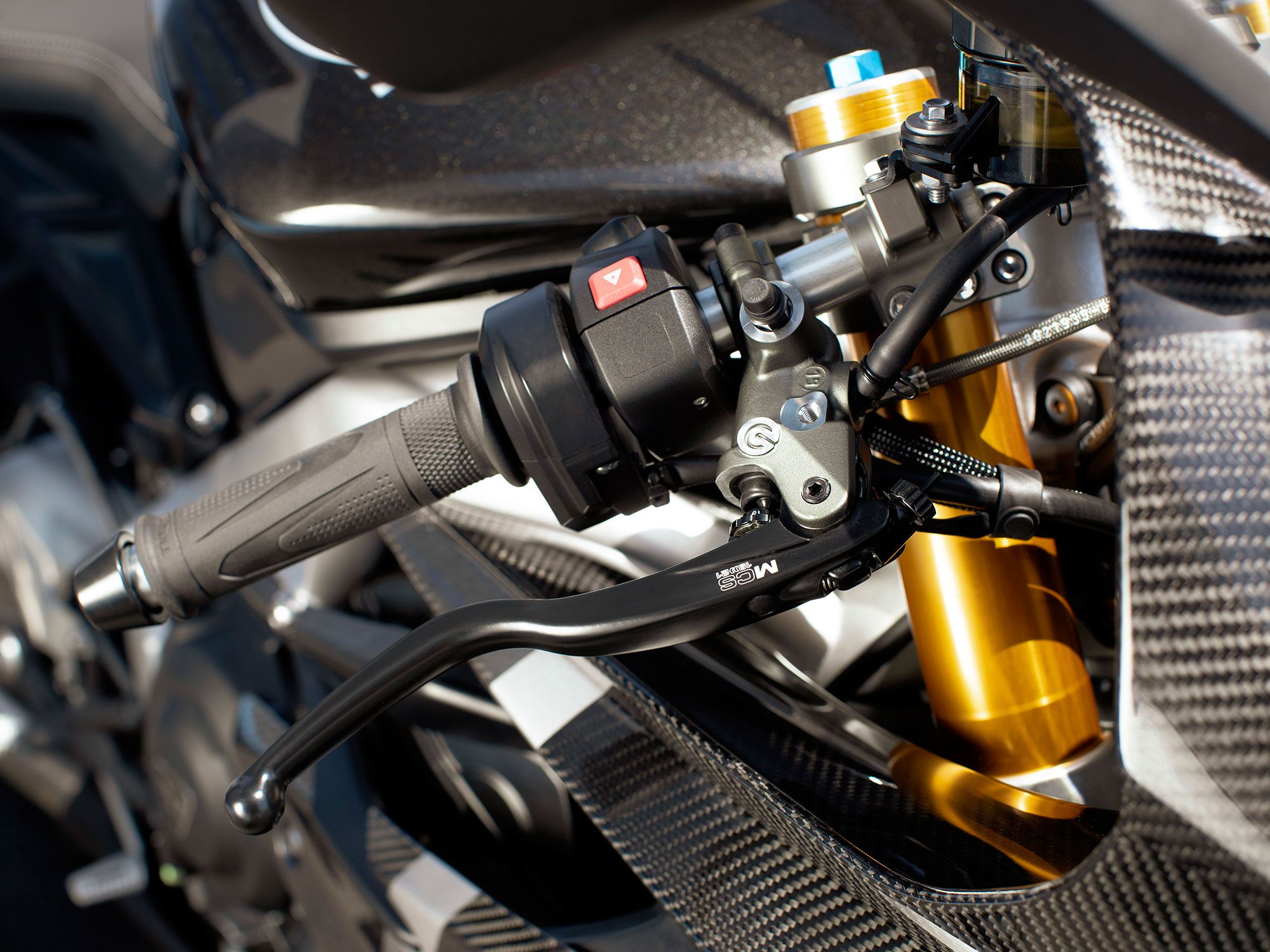
Hold the throttle wide for a few moments and it’s easy to fall in love (again) with the Daytona’s charismatic engine howl and connected rear tire feel. There’s a reason why other motorcycle manufacturers have engineered their own middleweight-plus I3s. The engine drinks from a 4.6-gallon tank and we averaged 37.5 mpg during mostly high-speed riding.
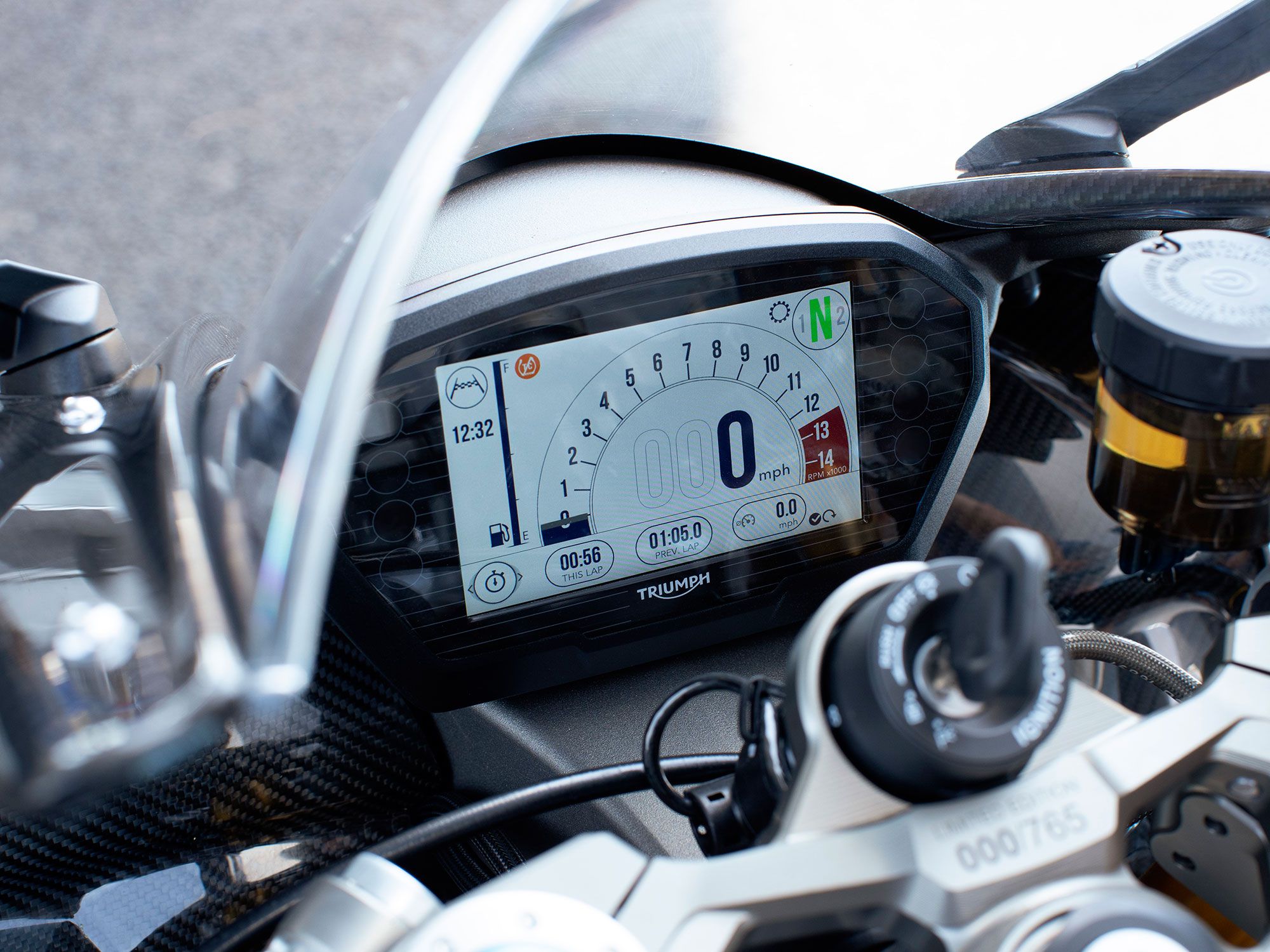
The 765 now benefits from a ride-by-wire throttle system which enables user-adjustable riding mode selection (Rain, Road, Sport, Track, and a customizable user setting). The throttle response remains as accurate as Triumph’s outgoing analog setup.
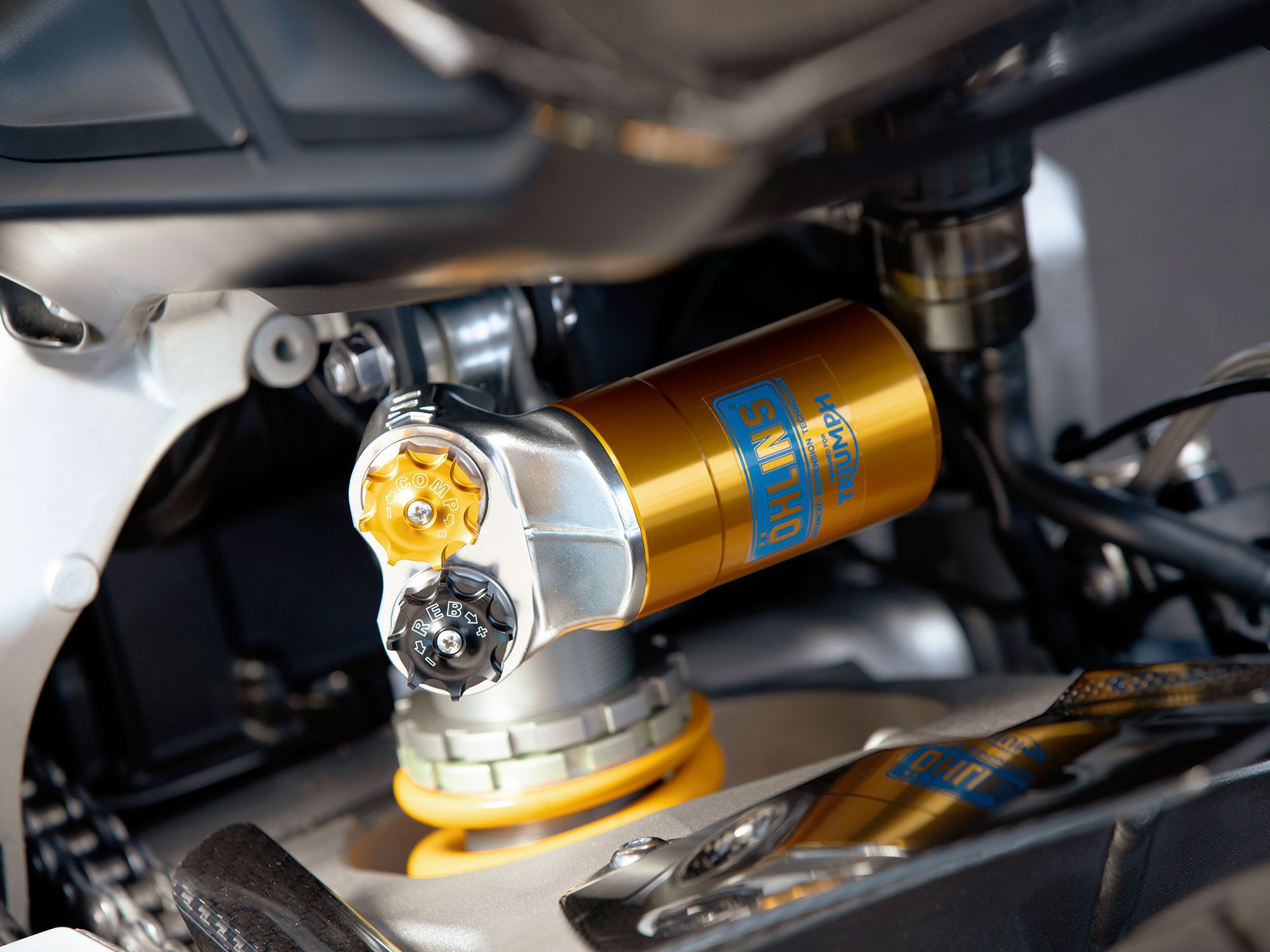
Each mode is tied to a specific engine, throttle, and traction control maps. The electronics generally work well at a moderate street pace, but feel dated compared to contemporary sportbike electronic packages.
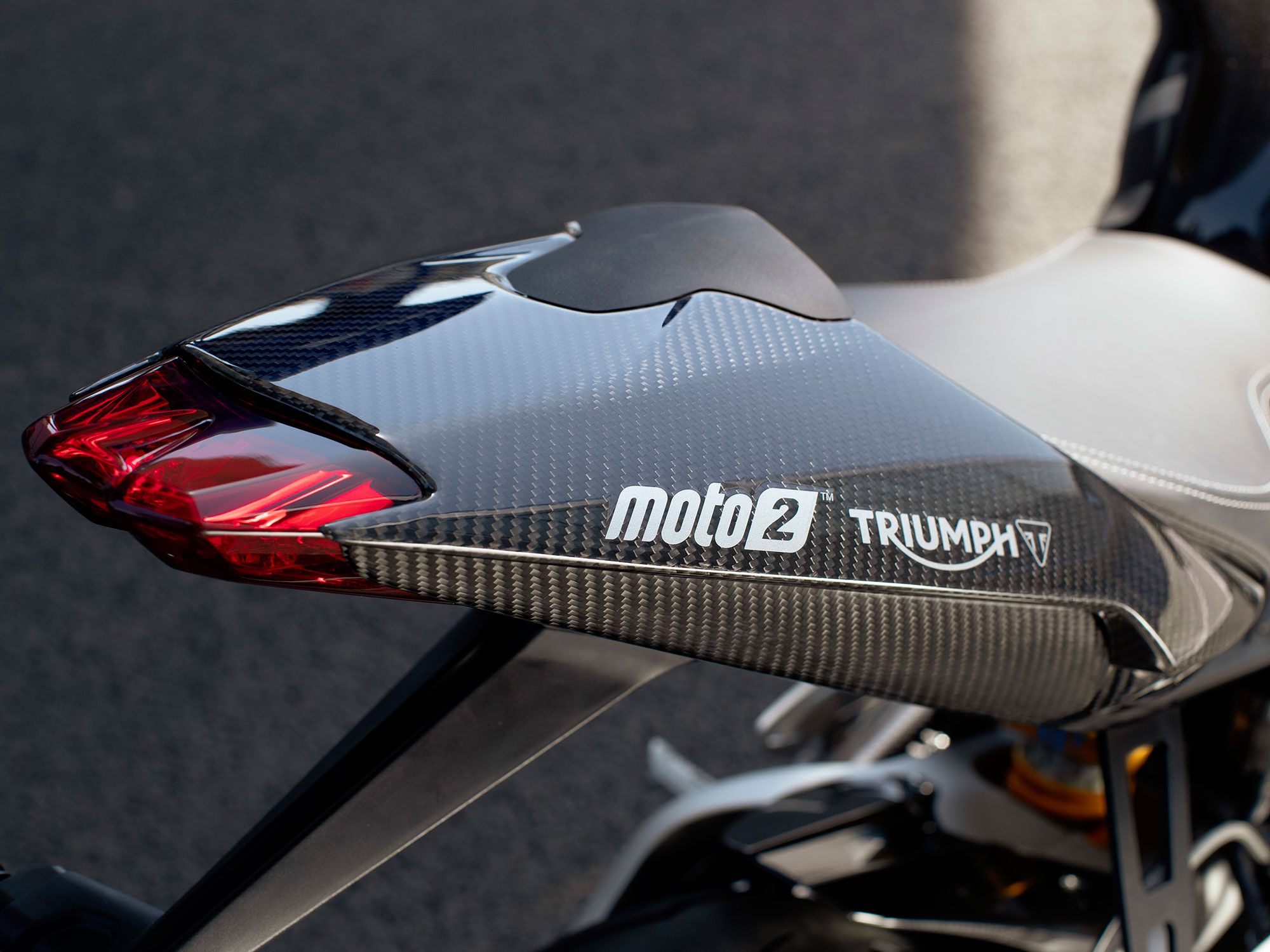
Chassis-wise the 410-some-pound Daytona remains nimble and apt to play. Steering geometry is relaxed slightly, which improves stability and reduces propensity for headshake during full-open throttle application. The Daytona continues to roll on manually adjusted Öhlins suspension.
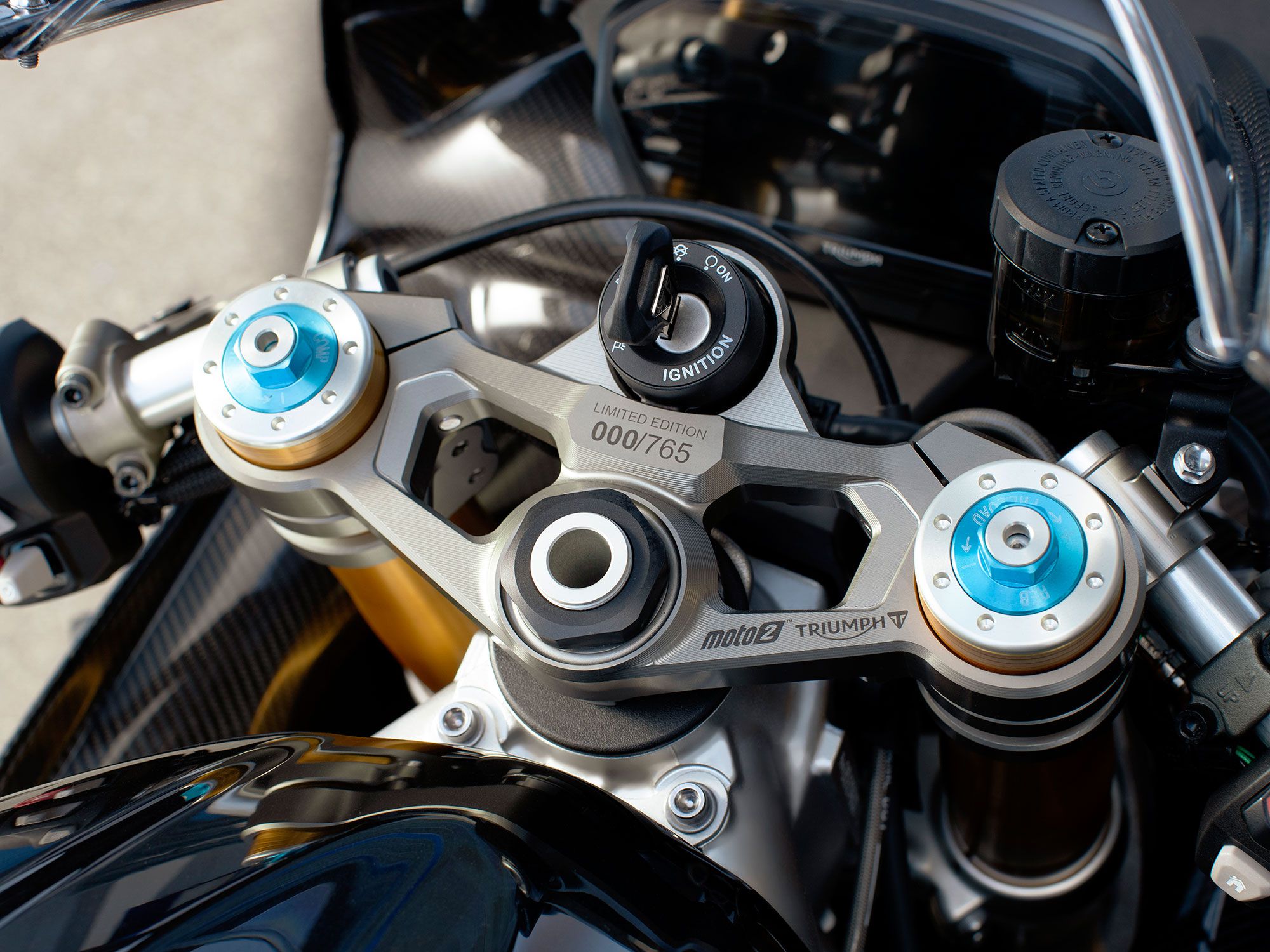
The suspenders offer a firm ride with pleasing action, and a wide range of damping adjustment. Track riders will especially appreciate the shock’s separate (TTX) compression and rebounding damping circuits that provide more accurate adjustment. Even though the components are 8 years old, they still perform well.
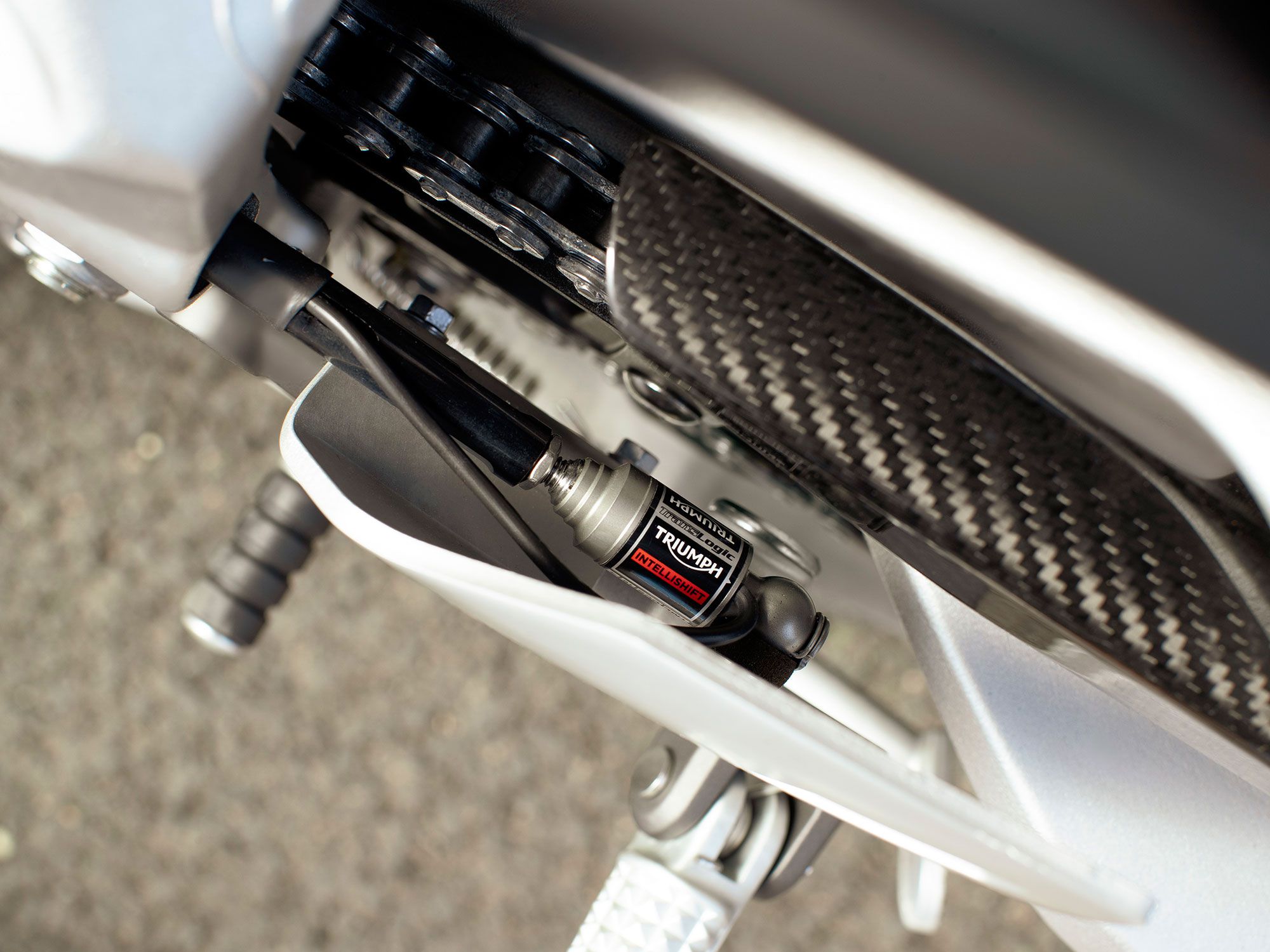
Aside from the delightful engine character, the braking package is a clear highlight. The Brembo radial-mount calipers and MCS-type adjustable-ratio master cylinder offer voracious brake bite with just the right amount of feel from the lever. Fixed, always-on ABS mitigates slides and braking instability. However, again, the ABS programming hardware input is of a more old-school design versus modern cornering ABS systems.
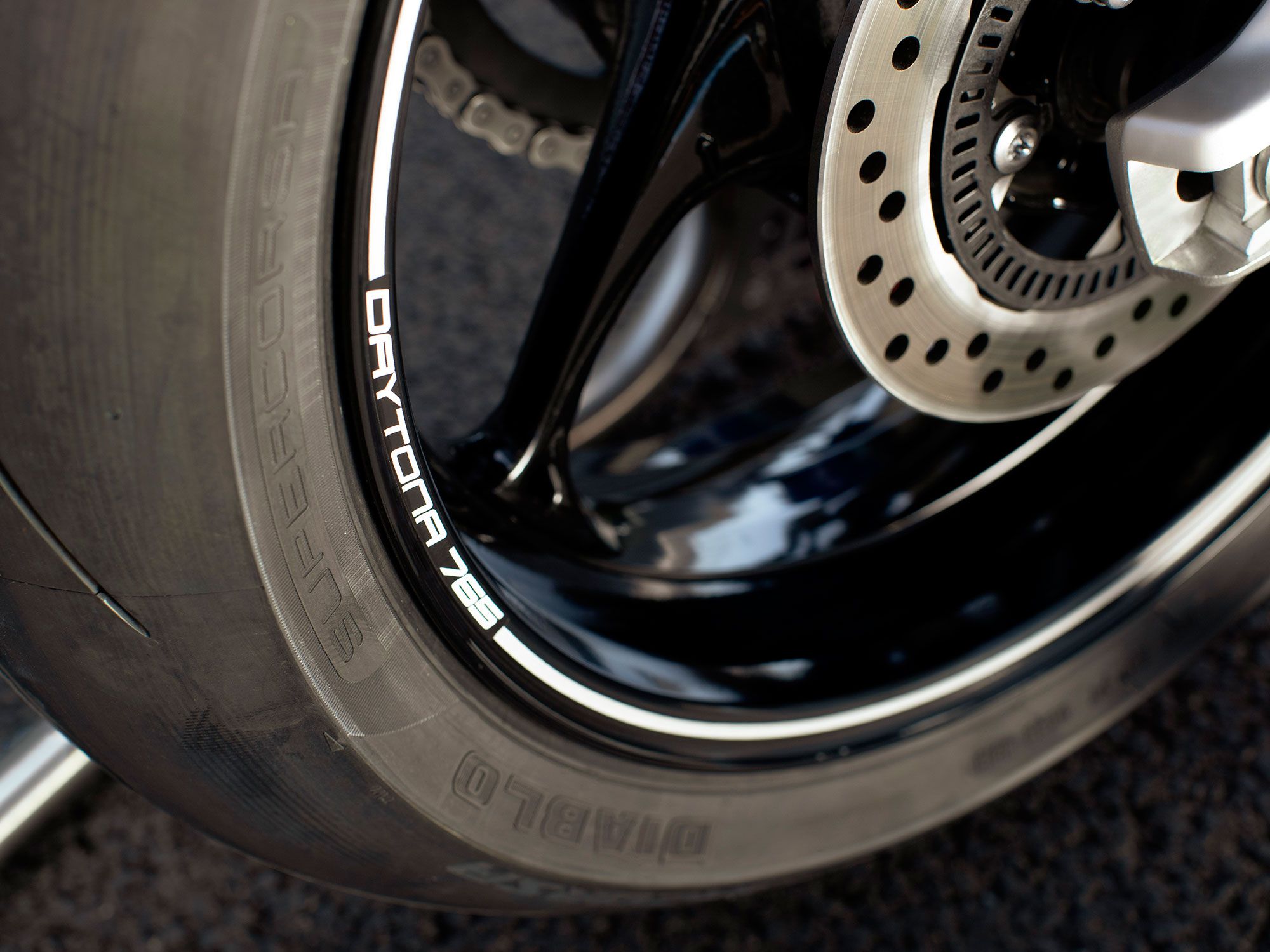
Price aside, there is a lot to like about riding this Moto2 replica. It’s a peppy sportbike with a fun-loving character that only one other sportbike can match in this displacement category. Its tried-and-true chassis remains nimble yet offers a hint more stability than we remember with the outgoing Daytona 675R. The front brakes are also one of the most adept setups at shedding speed on a sportbike. If you want to own a piece of grand prix racing history that you can ride to work, now’s your chance.
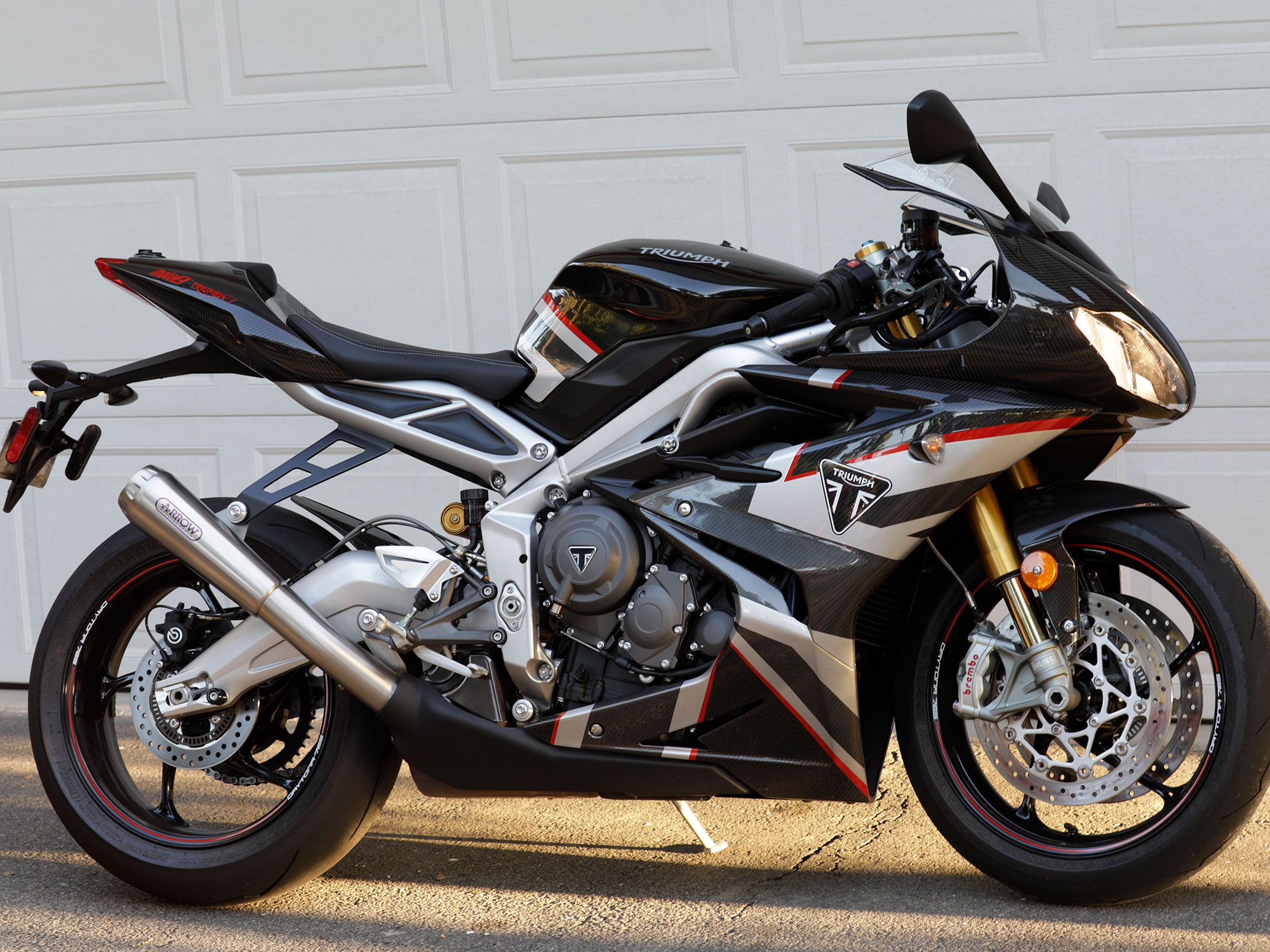
Gearbox
Helmet: Shoei RF-SR
Jacket: Alpinestars Viper Air
Gloves: Alpinestars Warden
Pant: Alpinestars Copper V2
Boots: Alpinestars Faster 3
2021 Triumph Daytona Moto2 765 Limited Edition Technical Specifications And Price
| PRICE | $17,500 as tested |
|---|---|
| ENGINE | 765cc, DOHC, liquid-cooled inline-three; 12-valve |
| BORE x STROKE | 78.0 x 53.4mm |
| COMPRESSION RATIO | 12.9:1 |
| FUEL DELIVERY | Multipoint sequential electronic fuel injection w/ SAI |
| CLUTCH | Wet, multiplate w/ slipper function; cable actuation |
| TRANSMISSION/FINAL DRIVE | 6-speed/chain |
| FRAME | Aluminum-beam twin spar |
| FRONT SUSPENSION | 43mm Öhlins NIX 30 fork, preload, rebound, and compression damping adjustable; 4.2 in. travel |
| REAR SUSPENSION | Öhlins TTX 36 twin-tube monoshock, rebound and compression damping adjustable; 5.2 in. travel |
| FRONT BRAKES | Brembo Stylema 4-piston radial Monoblock calipers, twin 310mm floating discs w/ switchable ABS |
| REAR BRAKE | Brembo 1-piston caliper, 220mm disc w/ switchable ABS |
| WHEELS, FRONT/REAR | Cast aluminum alloy 5-spoke; 17 x 3.5 in.; 17 x 5.5 in. |
| TIRES, FRONT/REAR | Pirelli Diablo Supercorsa SP V3; 120/70-17 / 180/55-17 |
| RAKE/TRAIL | 23.2°/3.6 in. |
| WHEELBASE | 54.3 in. |
| SEAT HEIGHT | 32.4 in. |
| FUEL CAPACITY | 4.6 gal. |
| CLAIMED DRY WEIGHT | 363 lb. |
| WARRANTY | Two years |
| AVAILABLE | Now |
| CONTACT | triumphmotorcycles.com |
Source: MotorCyclistOnline.com
It might seem early to be registering for the 10th annual Distinguished Gentleman’s Ride, but the event has been moved forward from September to May from this year.
The ninth annual event went virtual in 2020 because of the pandemic, resulting in the number of participants and fundraising for the Movember Foundation being halved.
Now the men’s health charity event is permanently moving to May from this year.
Organisers hope the shift to May for the northern hemisphere riding season will better suit riders and increase fund-raising opportunities.
“We know how important it is to physically connect with our community,” the organisers said.
I’ve been to DGRs in various cities both here in Australia and overseas, and of course, the weather can be unpredictable.
While you can ride any time of the year in my home state of Queensland, DGR participants might prefer the more tweed-oriented cooler temps.
Since 2012, the event has connected hundreds-of-thousands of classic and vintage style motorcyclists from more than 100 countries and raised $US27.45m for men’s health.
Organisers hope to crash through the $US30m barrier this year.
Ride founder Mark Hawwa of Sydney says the ride will vary according to pandemic restrictions in each country with some being virtual as they were last year.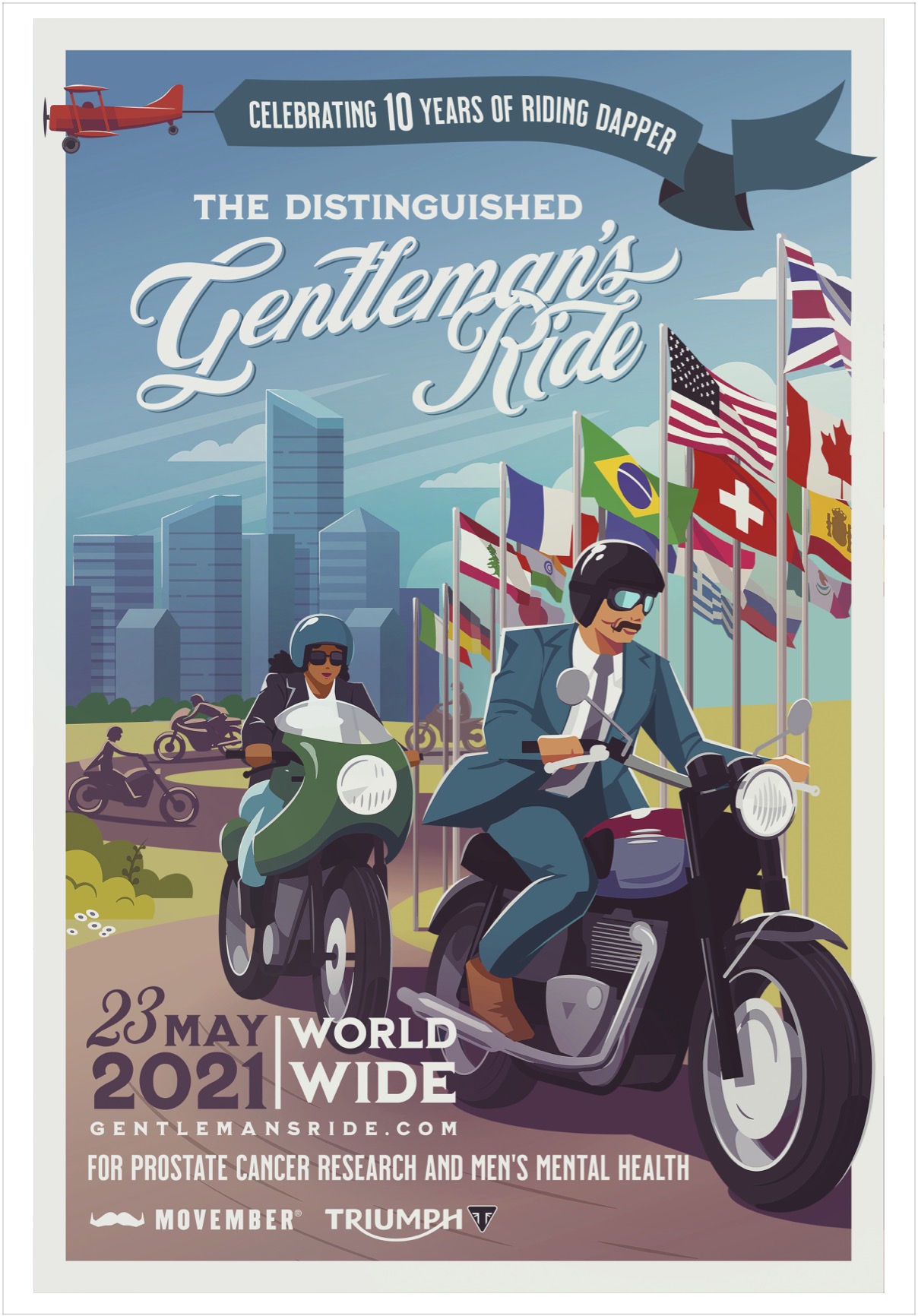
Fund-raising incentive prices are:
Source: MotorbikeWriter.com
Australia’s internationally awarded MotoCAP motorcycle gear safety ratings service has added ratings on safety and comfort for eight jackets and eight pants to its growing list of tested products.
The new ratings brings the total number of items of clothing to 297, comprised of 125 jackets, 80 pairs of pants and 92 pairs of gloves.
Draggin Holsehot jeans top-scored on safety with four out of fives, followed by the Klim Artemis with twi stars.
Only one safety star was awarded to Merlin Route One Hardy, BME Waterproof Herren, Melbourne’s Saint Unbreakable Straight, Bull-It Easy Tactical Cargo, Triumph Urban Jeans and Macna Club.
While the Holeshot jeans performed well, MotoCAP says it could have done better if the knee and hip impact protectors were better quality.
Many of the others did not feature both sets of armour, marking them down on impact protection.
It was a similar situation in the jackets.
The new ratings for jackets can be viewed here. The new ratings for pants can be viewed here.
Deakin Uni Institute for Frontier Materials Senior Research Fellow and Honda GB400 rider Chris Hurren says there is a need for a holistic approach to safety.
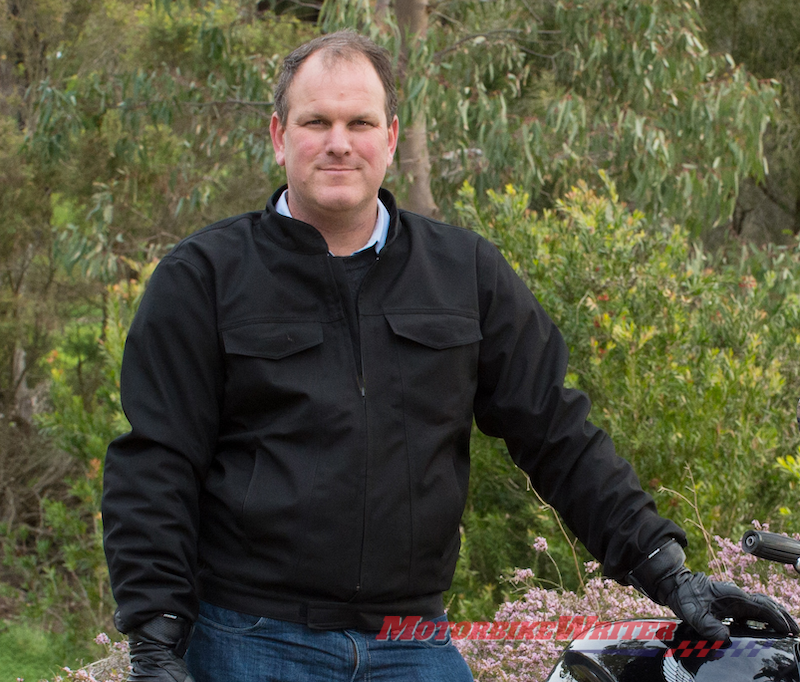
He says rider jackets and pants should include proper impact protection, as well as high abrasion resistance.
Chris says many garments don’t come with impact protectors or only a few protectors.
“Some of the garments could be five star if they just had a full set of certified protectors,” he says.
“Then it’s the rider’s choice if they want to throw them away if they don’t want to wear them.”
MotoCAP is a partnership between Transport for NSW, State Insurance Regulatory Authority (SIRA), VicRoads, Transport Accident Commission (TAC), Royal Automobile Club of Victoria (RACV), Department of Transport and Main Roads (TMR), Motor Accident Insurance Commission (MAIC), Lifetime Support Authority (LSA), the Department for Infrastructure and Transport, Western Australian Police: Road Safety Commission, Department of State Growth, Insurance Australia Group (IAG), Australian Motorcycle Council and Accident Compensation Corporation in New Zealand.
Testing is carried out by the Deakin University Institute for Frontier Materials on behalf of the MotoCAP partners.
Source: MotorbikeWriter.com
Aprilia is carrying on its proud tradition of building high-end small-displacement mounts this year, with a redesign of its SX 125 and RX 125, its foreign-market 125cc, four-stroke SuperMotard and dirt bike.
The tiny thumper that powers the little beasts gets a rethought top end this year, thanks in part to new Euro 5 emissions regulations. Aprilia says it raised the intake to feed air more directly to the all-new head, which sports revised cams and a new combustion chamber. The exhaust is also entirely new, featuring a new catalytic converter and muffler. The result is a wider torque curve and peak power lower down the rev range. No more wringing your 125′s neck to get it moving.
The Bosch ABS brakes get new gadetry too, to keep the front wheel from locking up and the rear wheel from lifting under heavy braking. The SX gets a 300mm disc up front backed with a 220mm unit out back, while the RX gets a 260mm front rotor backed with the same 220mm rear disc.
The little bikes both get 41mm inverted forks with 240mm (9.4 inches) of travel, and a single shock out back with 210mm (8.3 inches) of rear wheel travel. The SX wears 17-inch spoked wheels with black rims, while the RX gets a 21-inch front wheel and 18-inch rear wheel.
Unfortunately, it doesn’t look like Noale has plans to bring the little Aprilias to these shores.
Source: MotorCyclistOnline.com
Yamaha Motor Australia has recalled its three-wheeler Niken as well as their FJR1300, MT09, MT10, XT1200 motorcycles from 2013-2020 over an issue with the brake switch.
The official recall notice issued through the Australian Competition and Consumer Commission says the faulty brake switch could “inhibit the cruise control and constantly illuminate the rear brake lights”.
“If the rear brake lights constantly illuminate, other road users will not know if the brakes are applied, increasing the risk of an accident or injury or death to the rider(s) and/or other road users.”
Owners of affected motorcycles should contact a Yamaha Dealer to arrange an appointment to have the brake switch replaced, free of charge.
Consumers can find their nearest authorised Yamaha dealership by visiting: https://www.yamaha-motor.com.au
For further information, contact Yamaha by phone on 1300 593 600.
Even though manufacturers and importers usually contact owners when a recall is issued, the bike may have been sold privately to a rider unknown to the company.
Therefore, Motorbike Writer publishes all motorcycle and scooter recalls as a service to all riders.
If you believe there is an endemic problem with your bike that should be recalled, contact the ACCC on 1300 302 502.
To check whether your motorcycle has been recalled, click on these sites:
Source: MotorbikeWriter.com
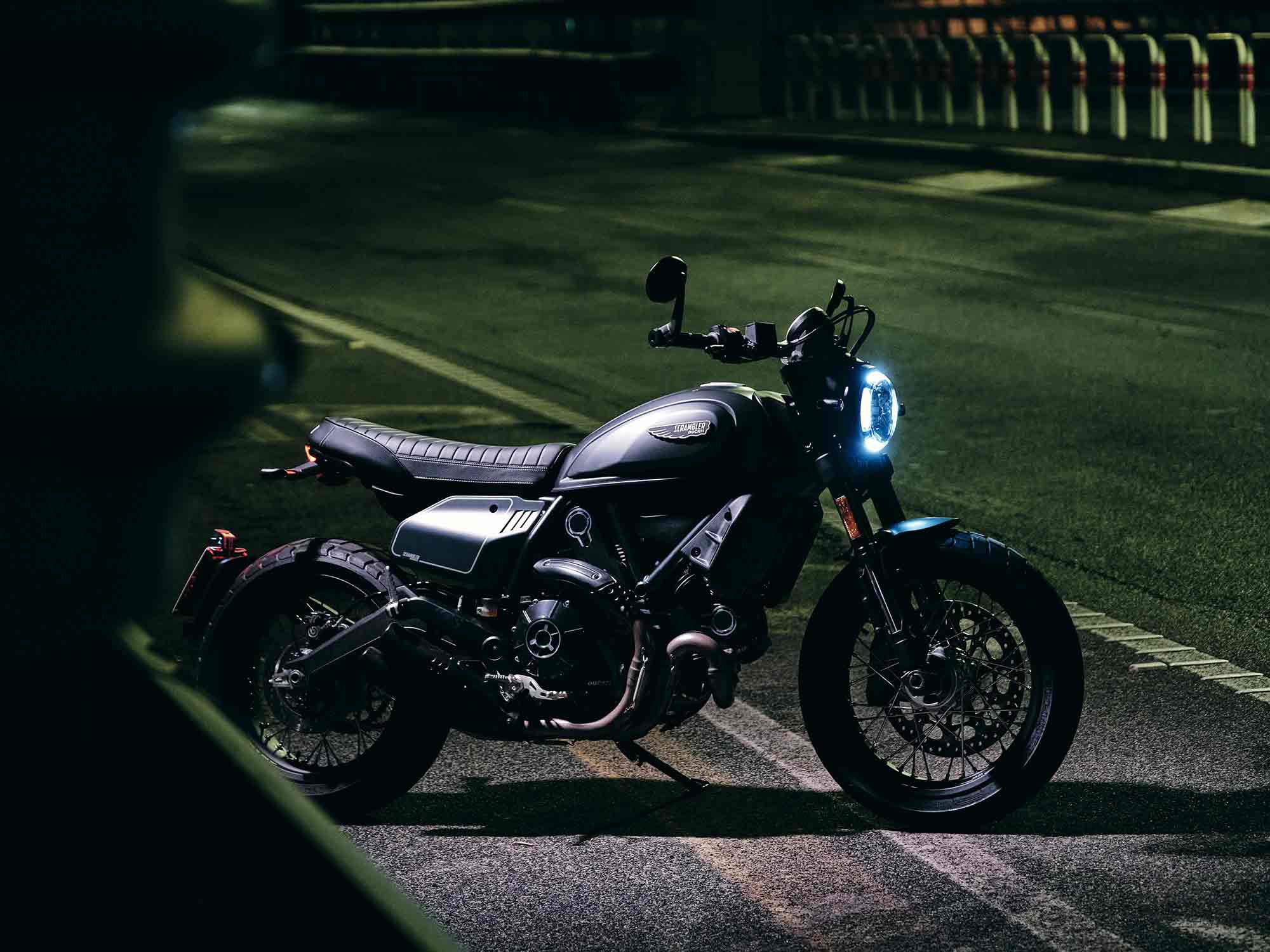
The Scrambler, in both 803cc and 1,079cc (1100) formats, has been a spectacular success for Ducati. The 800 topped Ducati’s sales charts from 2015 to 2019. For 2021 Ducati has cut down the Scrambler range, removing the Café Racer and Full Throttle, and introduced one new model, the Nightshift.
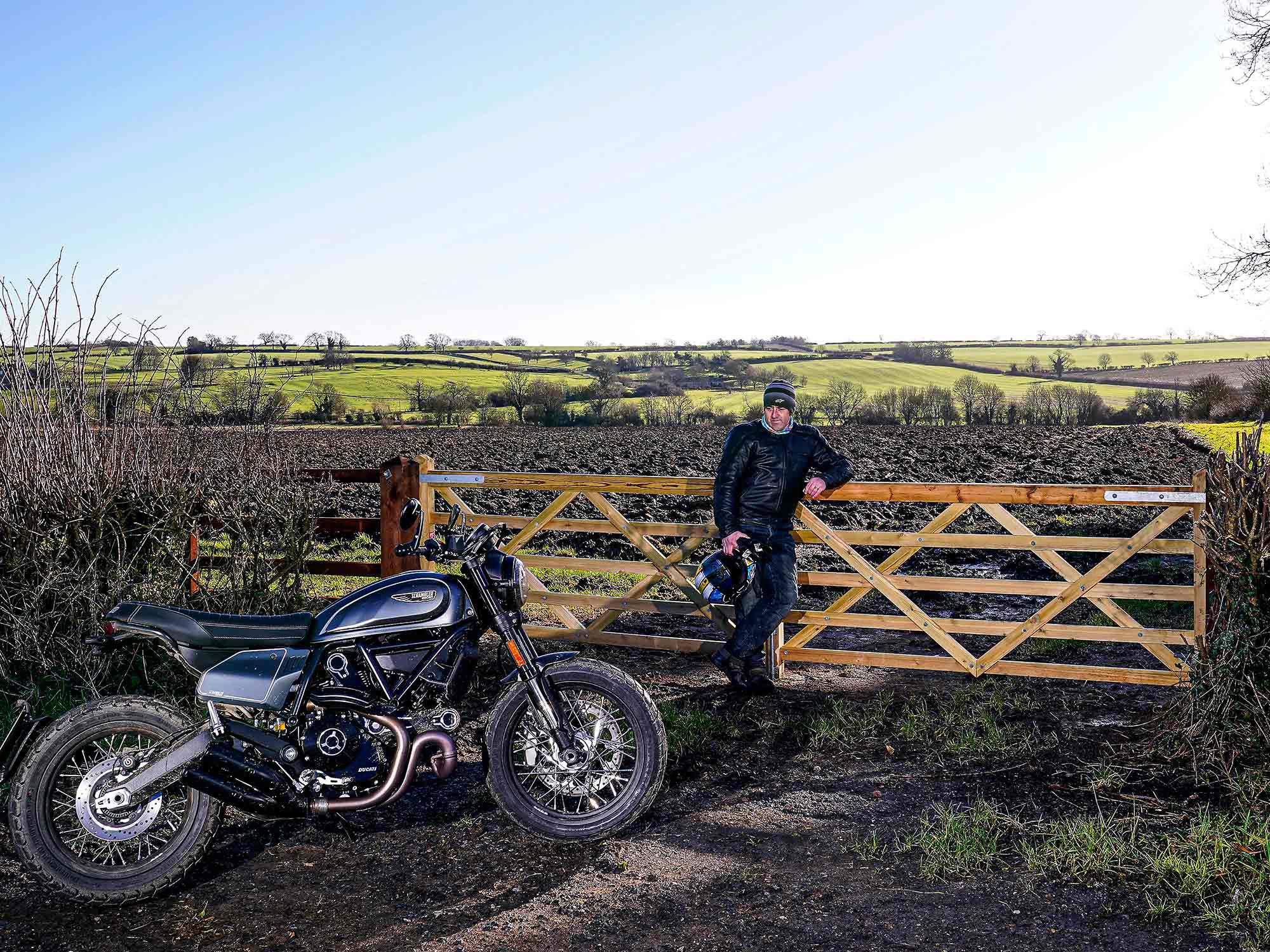
The relatively basic air-cooled L-twin is loosely based on the old Ducati Monster 796 (803cc) engine (which produced a quoted 87 hp). Bore and stroke are the same, but valves, injectors, exhaust, intake, airbox are all completely different. In 2019 Ducati introduced a lighter hydraulic clutch, instead of the conventional cable, and in 2021 the engine remains unchanged.
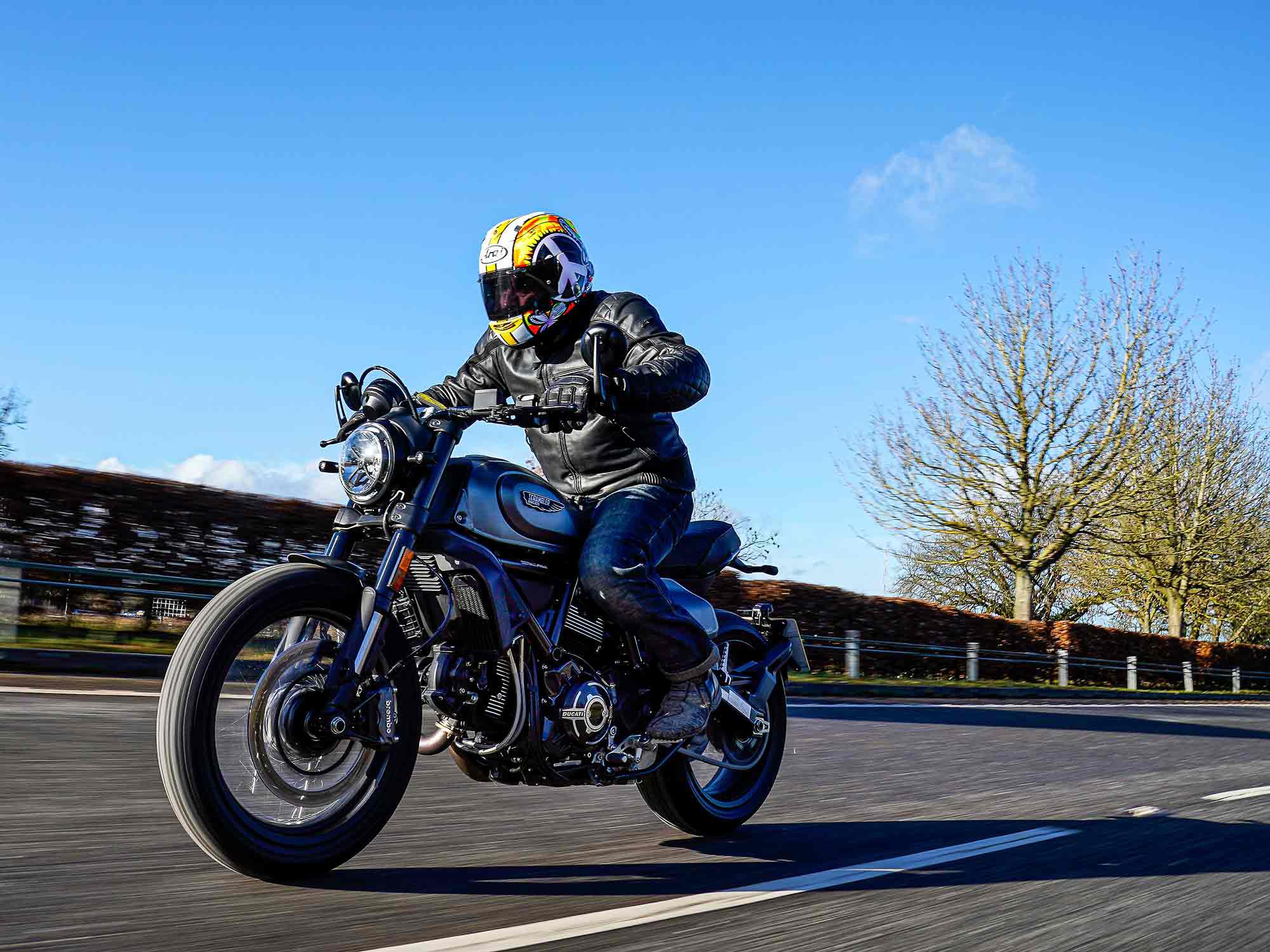
The base of the engine is more than 10 years old, and output, 73 hp at 8,250 rpm and 48.8 pound-feet at 5,750 rpm, will hardly impress your mates down at the gym. But the engine is bulletproof, eminently usable, and, crucially in this market, attractive. Ducati could have gone hunting for more power with a modern, water-cooled engine but it wouldn’t have had the visual allure and character of the simple air-cooled L-twin.
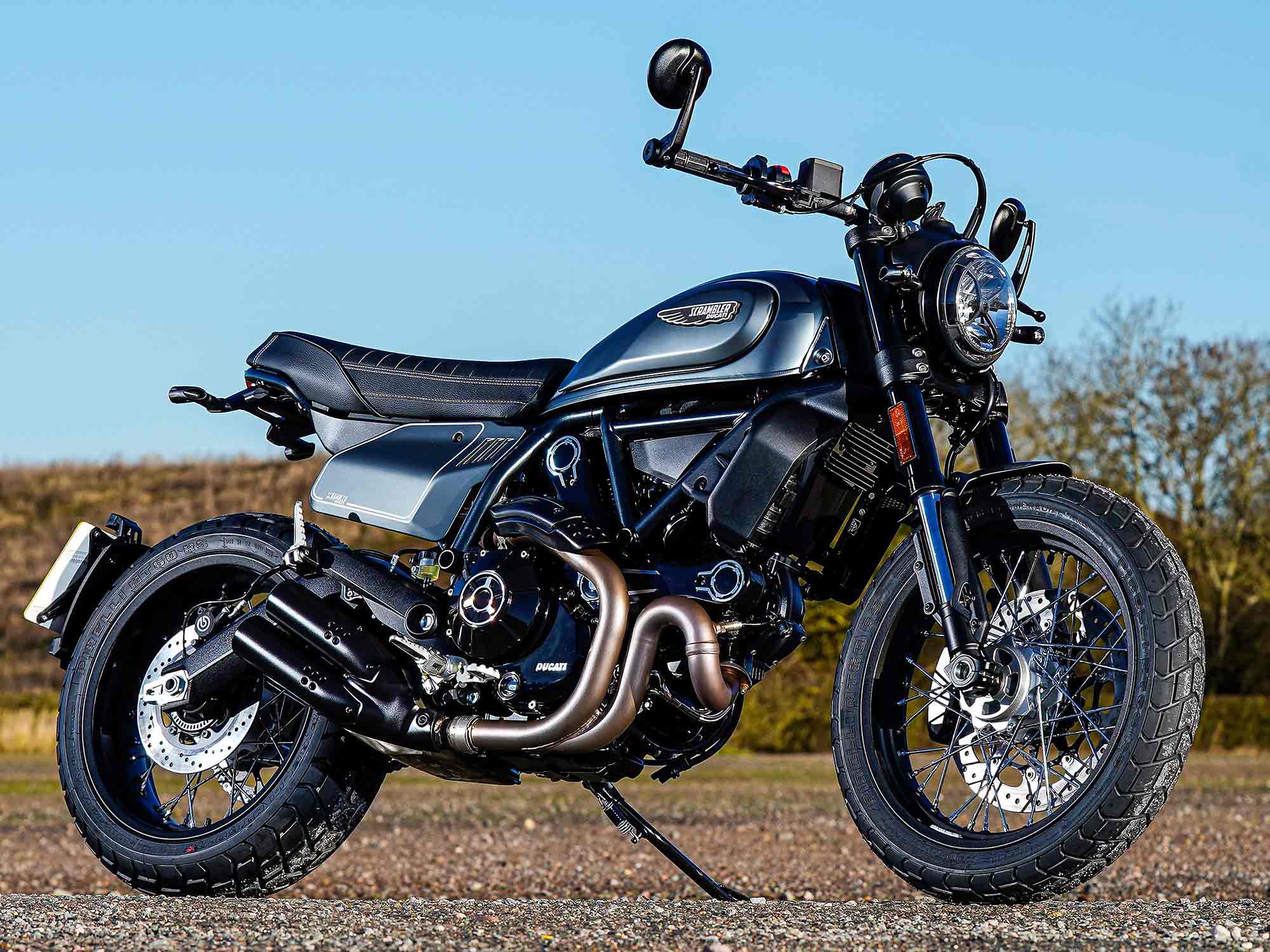
The air-cooled motor has been diluted by Euro 5 restrictions, and the attractive, twin-stacked exhaust just about beats out enough decibels for it to offer some personality. Power delivery is soft and friendly, and there is a lovely connection, even at low speeds. Peak torque is at just 5,750 rpm so there’s no real need to rev the twin; instead short-shift and enjoy the usability of the desmo motor.
That flat torque curve gives great drive from anywhere, and when combined with typical Scrambler lightness, you soon realize this is anything but a slow bike. I’ve done incalculable miles on different variants of the Scrambler over the years, and I’m always pleasantly surprised by its energetic and well-measured performance, which is more than enough for the road and cruising along at freeway speeds without it feeling breathless. Experienced riders dropping down in capacity for a Scrambler may miss the lack of over-rev and might crave a little more excitement toward the top-end too, but the target audience of new and inexperienced riders will love its accessibility.
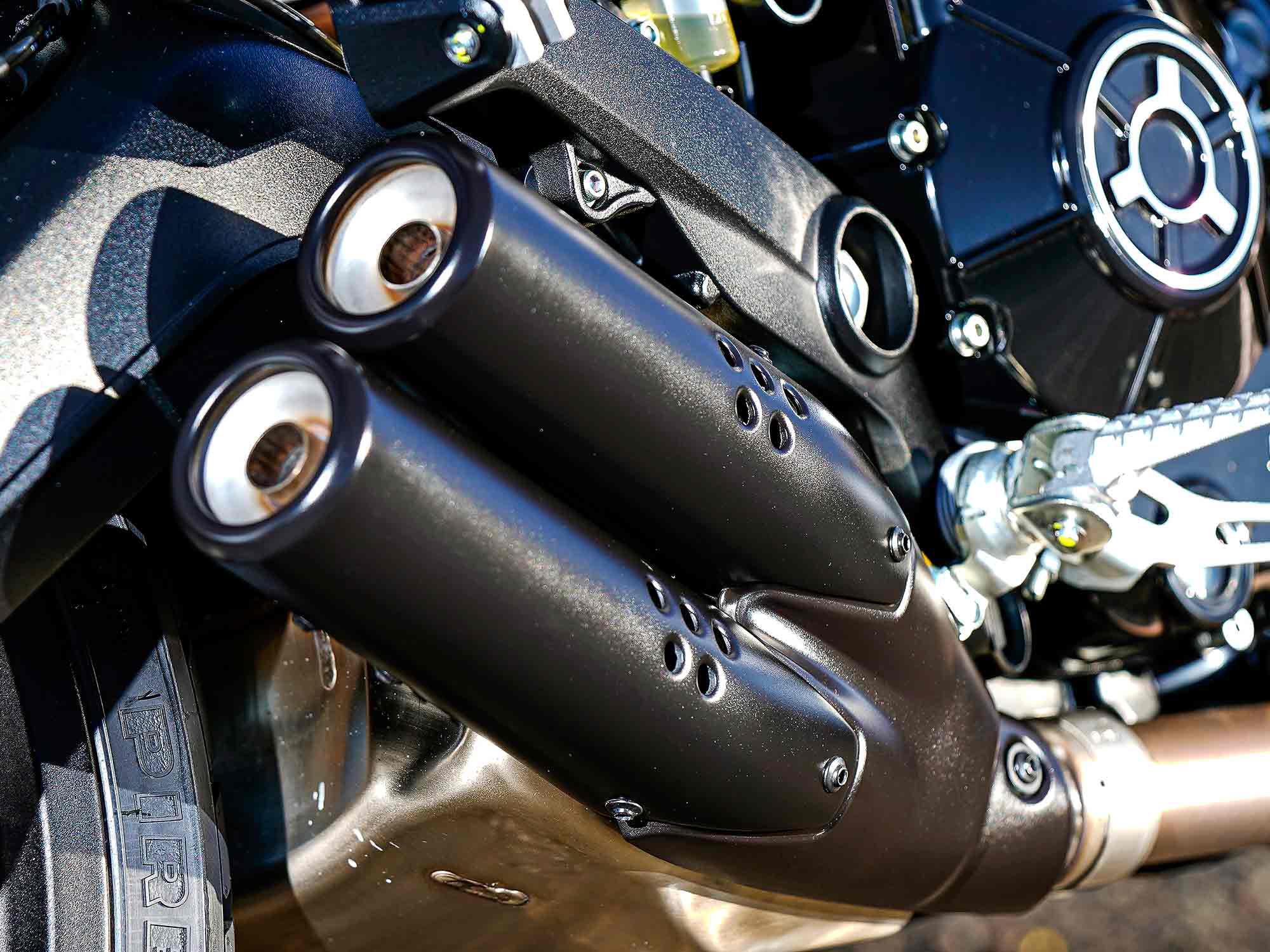
The straight and narrow handlebar, complemented by racy bar-end mirrors and retro side-mounted number plates, give the notion of a radical riding position, whereas it’s much more relaxed than it appears.
The new bars are not as natural as the standard Icon’s traditional Scrambler bars but, equally, they aren’t extreme or uncomfortable, even at low speeds. Taller riders may find the bars more compromising, but they aren’t as radical as you might think—the Nightshift may appear to have a sporty edge but, in reality, it’s as extreme as mini-golf.
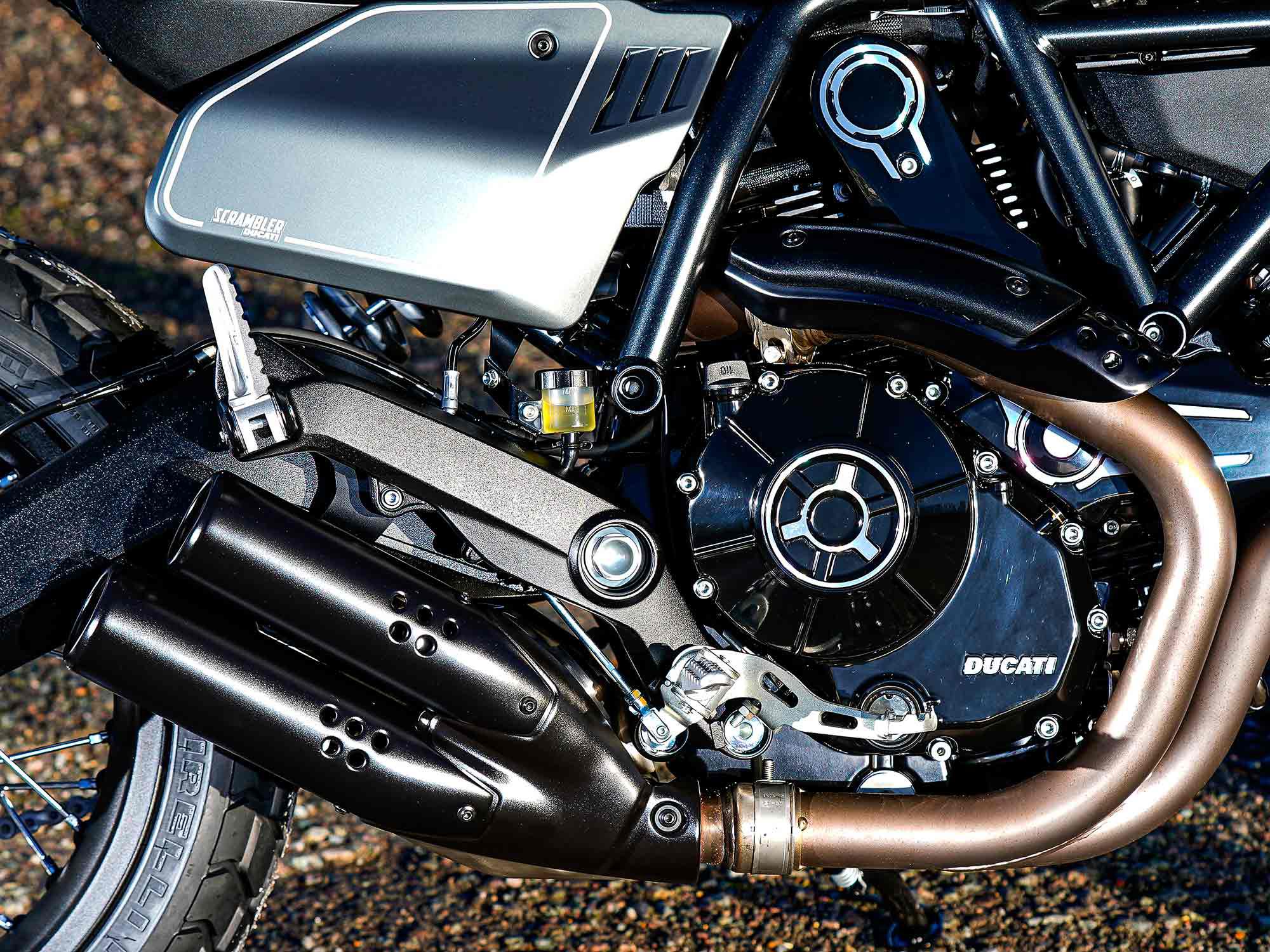
The steering is a little slower—not as natural. On the standard Scrambler, you’re upright, turning with wide, welcoming bars. In comparison, on the Nightshift you’re further forward in the chassis, more over the fuel tank, which gives a racier feel. You feel more obliged to hang off the Scrambler midcorner, rather than sit back and simply turn in a conventional manner. I like it, though, the riding position encourages you to tuck in and stretch the cable a little more.
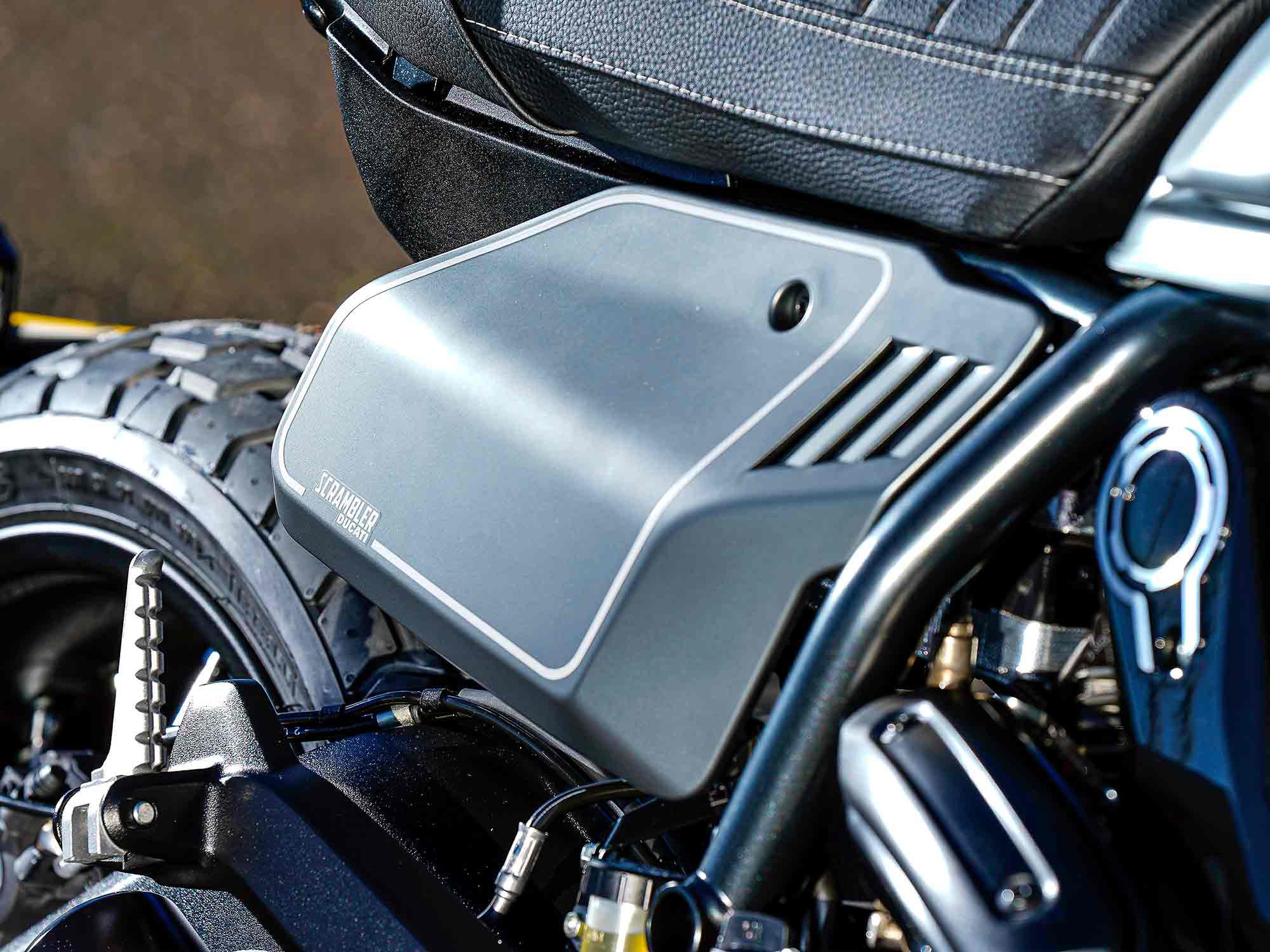
The bike is light at 397 pounds, flickable, and almost toylike at times. It is just as happy on the faster stuff as it is cutting up traffic around town. With an 18-inch front wheel and 17-inch rear and off-road-looking rubber, it shouldn’t really work, but it does.
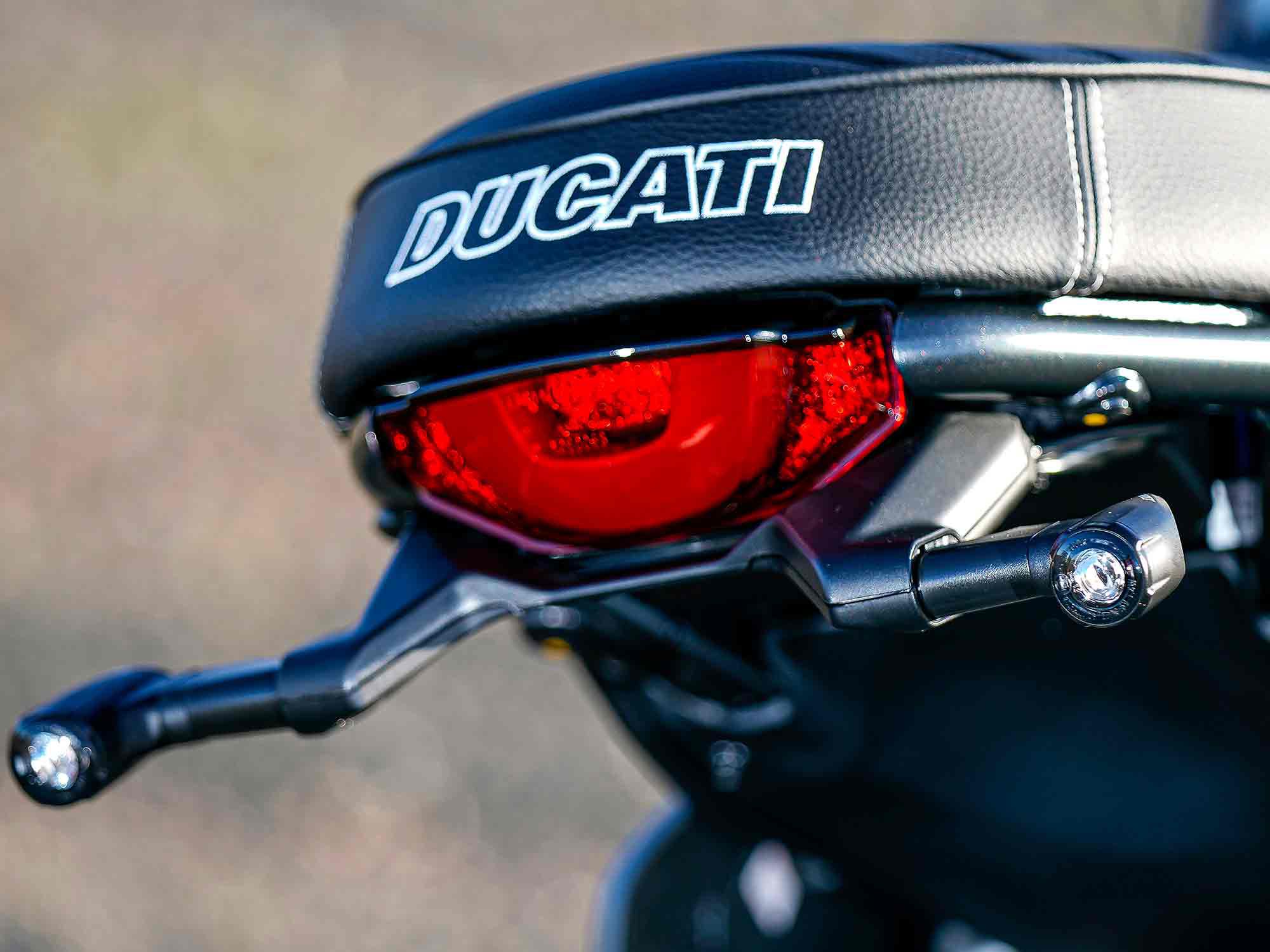
Those Pirelli MT 60 tires work well in both the dry and the wet and offer great response. You can have fun on the Scrambler, carrying corner speed with confidence. Even when you push on, it still performs and is far more capable than it needs to be.
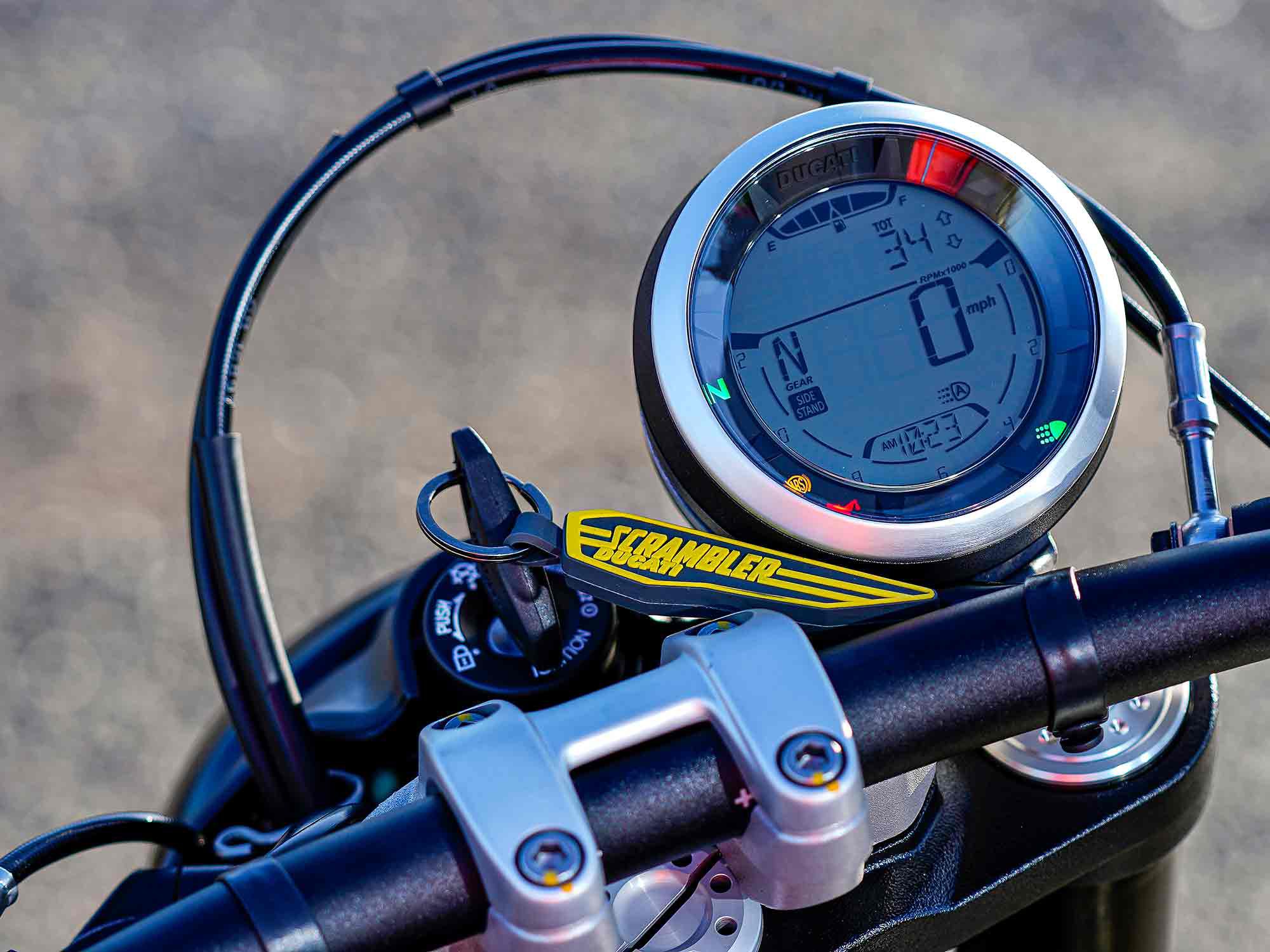
As the Nightshift is so light and speeds should be relatively low, the single-rotor stoppers are more than capable, and aren’t too abrupt. The introduction of cornering ABS was a welcomed addition for new and experienced riders alike and isn’t intrusive.
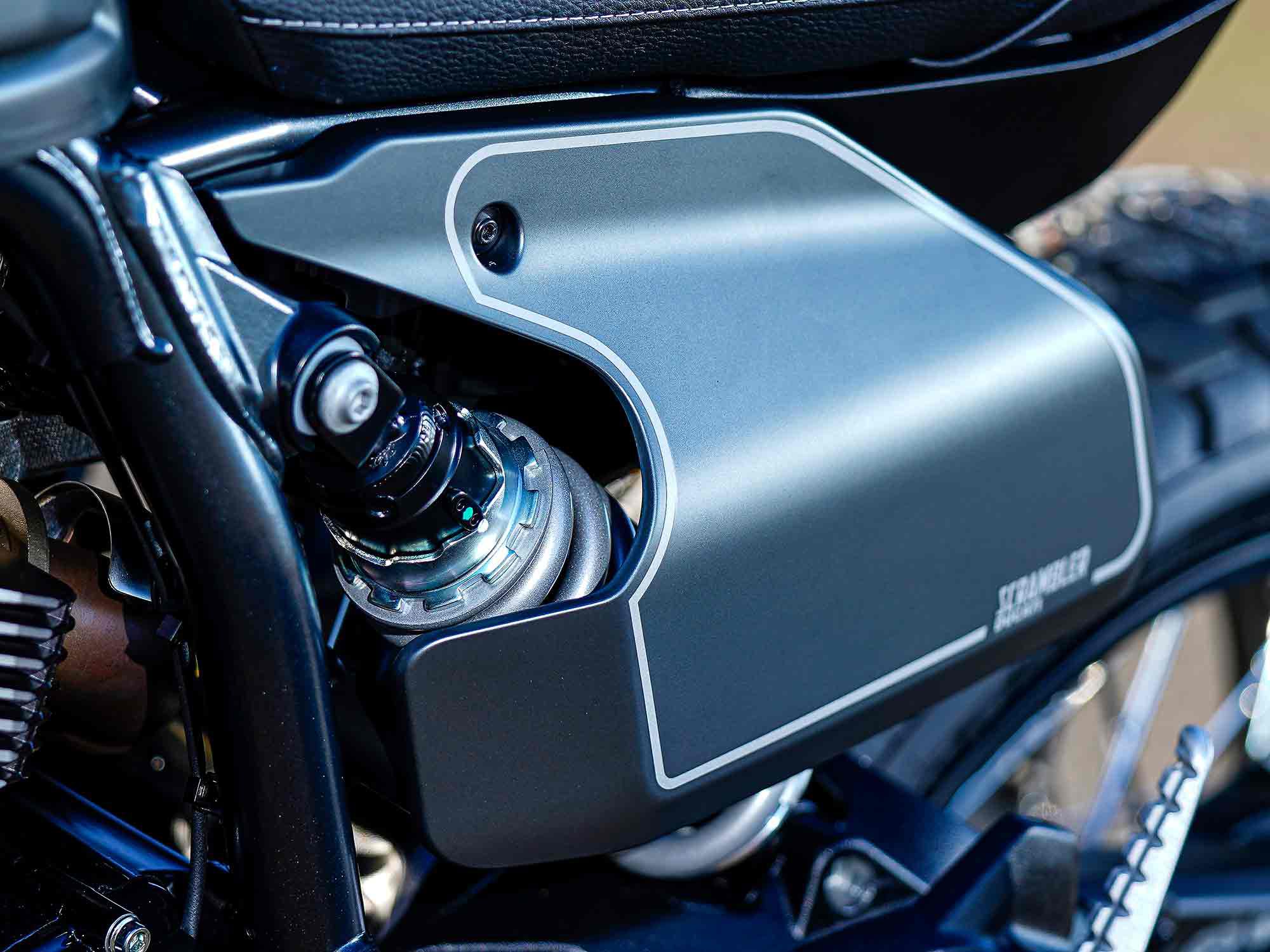
Cornering ABS carries on from the previous model, yet there are still no additional rider aids like traction control. Are sophisticated rider aids needed on a relatively slow-revving air-cooled Ducati that has excellent mechanical grip and feedback anyway? Possibly not, but new riders might be more attracted to the competition which has TC as standard.
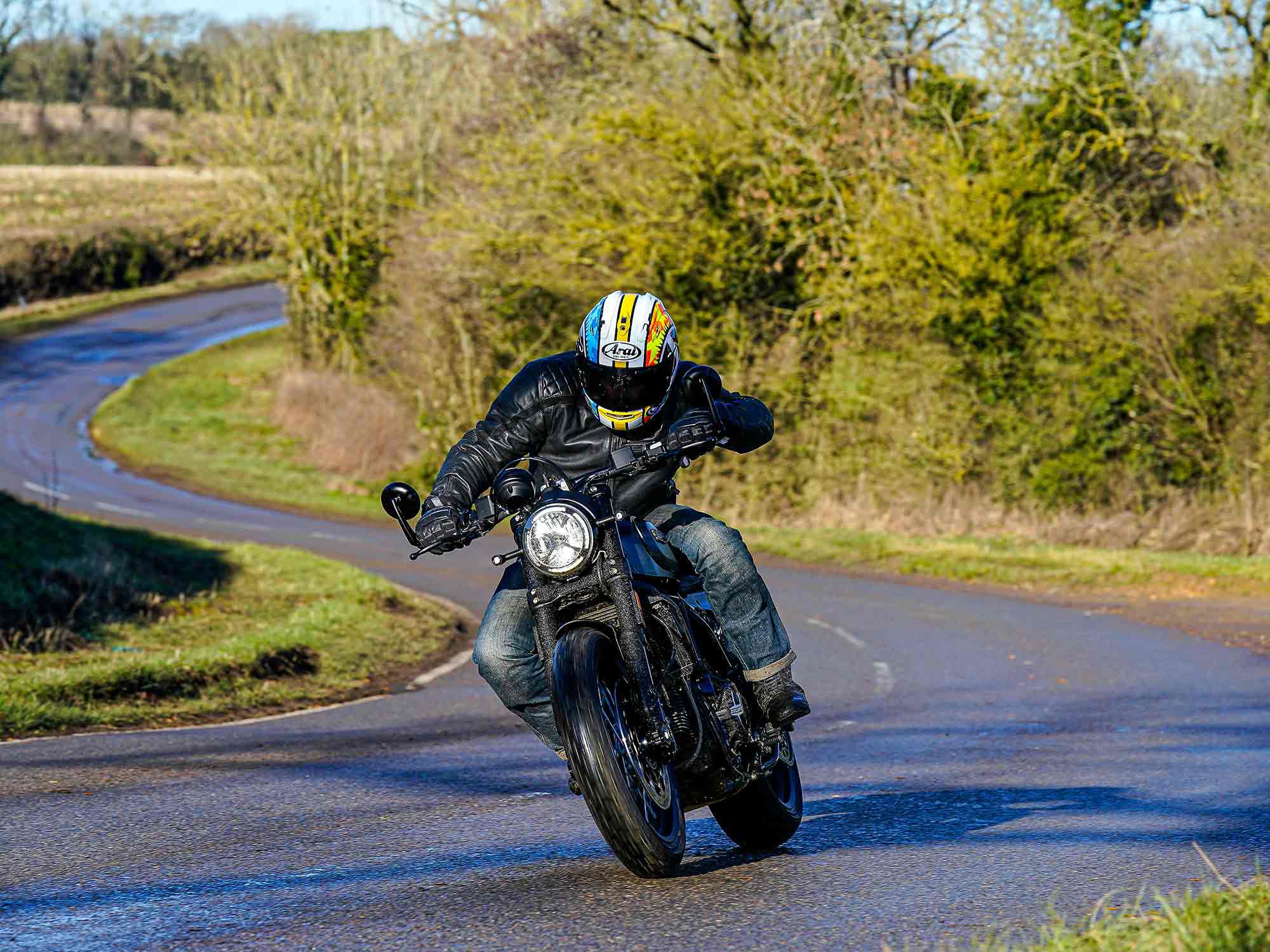
If the Nightshift isn’t individual enough for you, there is a plethora of accessories to personalize the Ducati further. One of the pleasurable characteristics of the Scrambler range is that you can add or remove parts easily; they are relatively simple to work on, and there is a hefty catalog of different exhausts, rear ends, and accessories to choose from.
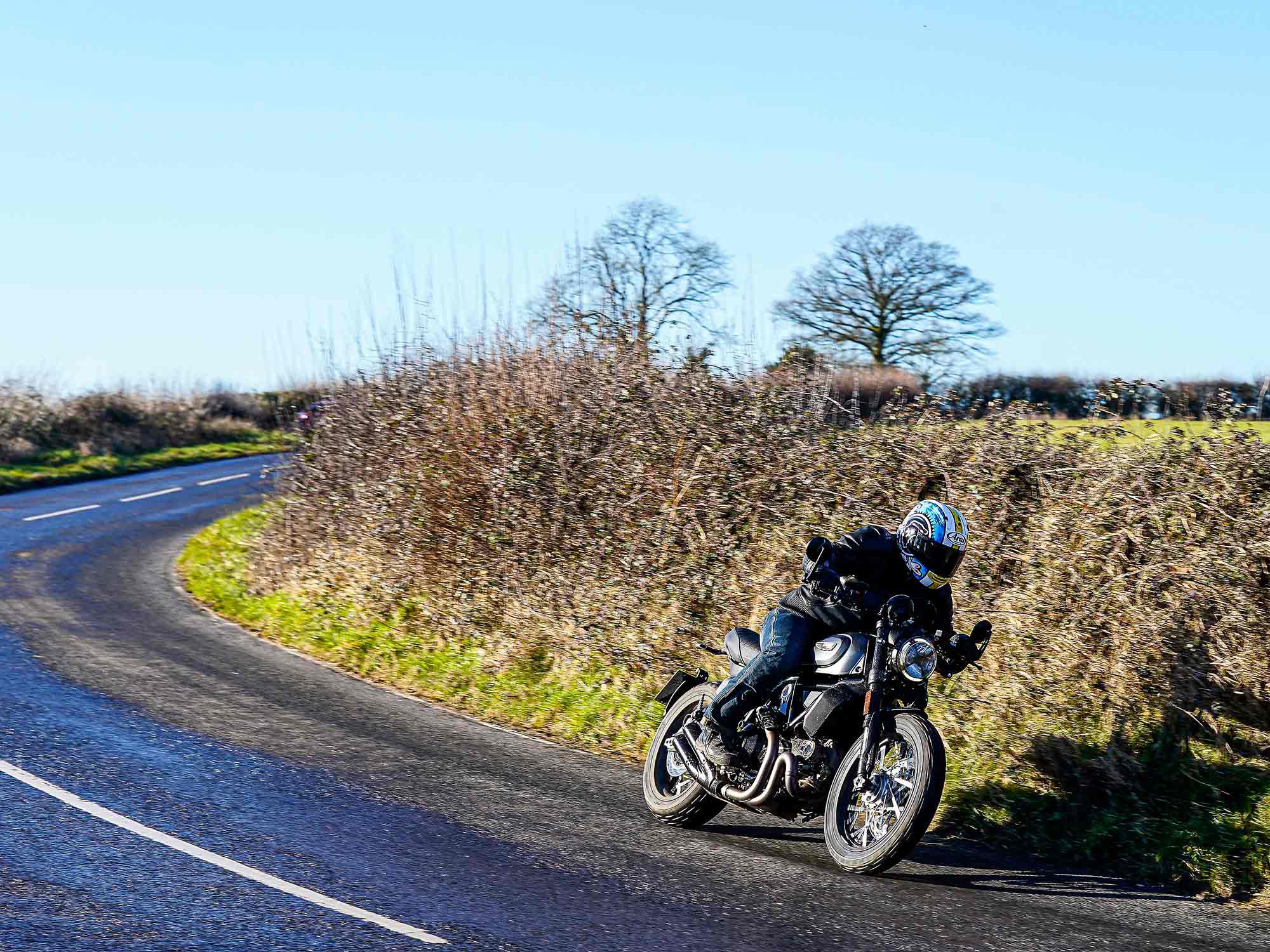
Verdict
The new Nightshift carries forward the original bike’s attributes, namely being easy to ride, fun, lightweight, good looking, and powered by a charming engine with enough performance on the road.

The Nightshift is an excellent first bike, a gentle step into the Ducati brand. The fact that it looks like a one-off special and not a standard production bike can only add to its allure. My only concern is the price. We are now more than $10K for an entry-level Ducati. Yes, I know this is a prestigious brand, and the bike looks stunning, but I think the increase in price from the original in 2015 might be a little too much for first-time buyers.
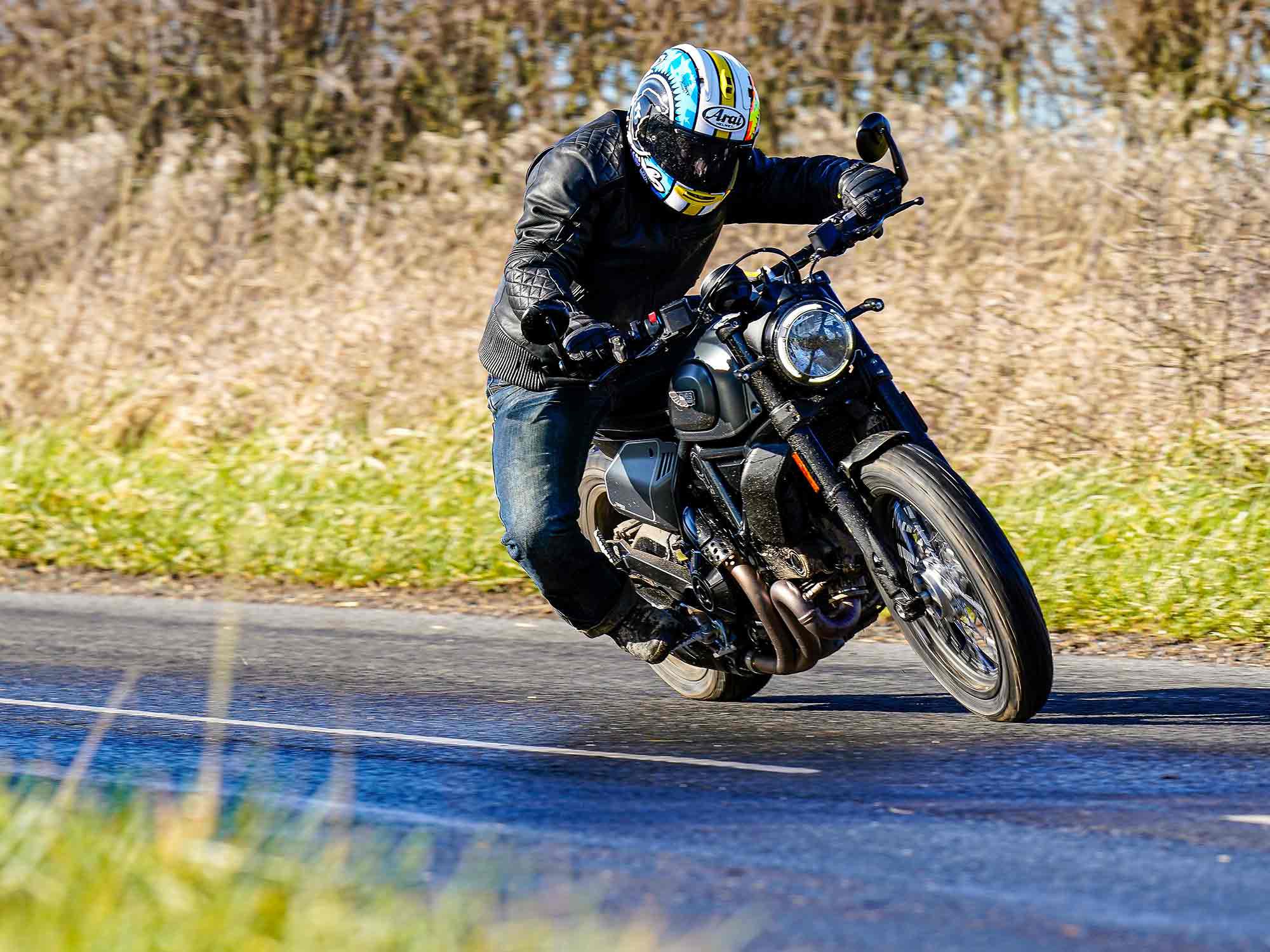
2021 Ducati Scrambler Nightshift Technical Specifications and Price
| PRICE | $10,995 |
| ENGINE | 803cc, air-cooled,L-twin; 2-valve/cyl. |
| BORE x STROKE | 88.0 x 66.0mm |
| COMPRESSION RATIO | 11.0:1 |
| FUEL DELIVERY | Fuel injection w/ 50mm throttle bodies |
| CLUTCH | Wet, multiplate slipper and self-servo; hydraulically actuated |
| TRANSMISSION/FINAL DRIVE | 6-speed/chain |
| CLAIMED HORSEPOWER | 73 hp @ 8,250 rpm |
| CLAIMED TORQUE | 48.8 lb.-ft. @ 5,750 rpm |
| FRAME | Tubular steel trellis |
| FRONT SUSPENSION | Kayaba inverted 41mm fork; 5.9 in. travel |
| REAR SUSPENSION | Single shock, spring preload adjustable; 5.9 in. travel |
| FRONT BRAKE | Radial 4-piston caliper, 330mm disc w/ Cornering ABS |
| REAR BRAKE | 1-piston floating caliper, 245mm disc w/ Cornering ABS |
| WHEELS, FRONT/REAR | Spoked alloy; 18 x 3 in. / 17 x 5.5 in. |
| TIRES, FRONT/REAR | Pirelli MT 60 RS; 110/80-18 / 180/55-17 |
| RAKE/TRAIL | 24.0°/4.4 in. |
| WHEELBASE | 56.9 in. |
| SEAT HEIGHT | 31.4 in. |
| FUEL CAPACITY | 3.6 gal. |
| CLAIMED DRY WEIGHT | 397 lb. |
| WARRANTY | 2 years, unlimited mileage |
| AVAILABLE | February 2021 |
| CONTACT | ducati.com |
Source: MotorCyclistOnline.com
When it comes to mandatory riding gear, most places require you to wear an approved helmet, but nothing else is required. It’s actually pretty weird when you think about it. A rider can go out on the bike sporting just about as much or as little protective gear they prefer.
Most riders raise the bar to wear an approved helmet, jacket, gloves, and in most cases riding boots/shoes but they have the choice – but they have the choice.
What about riding without gloves? Personally, I don’t leave the house without them, but that could be just me. Again, the choice is yours.
For our French friends across the pond – it’s been mandatory to wear approved motorcycle gloves for quite a while now. But they are about to be joined by Spain when it comes to mandatory riding gloves.
There was recently a meeting with the DGT (Directorate-General for Traffic) and additional stakeholders surrounding the proposed increase use of air-vests – which are most commonly found to be used on racetracks. The meeting ended up spreading the fear of mandatory use of air-bag vests on or off of the racetrack and was adjourned.
The meeting wasn’t completely wasted as it also pointed out that it would be following in France’s footsteps when it comes to riders wearing approved gloves. There was no specific time for the rule to take effect but it is sure to happen soon.
For me, this wouldn’t be big deal whatsoever. But how about you? What are your thoughts on mandatory gear laws?
Source: MotorbikeWriter.com
Testing the KTM 2021 at Jerez!
Nice edit from @vtowind
#work #test #team
Source: Dani Pedrosa on Facebook